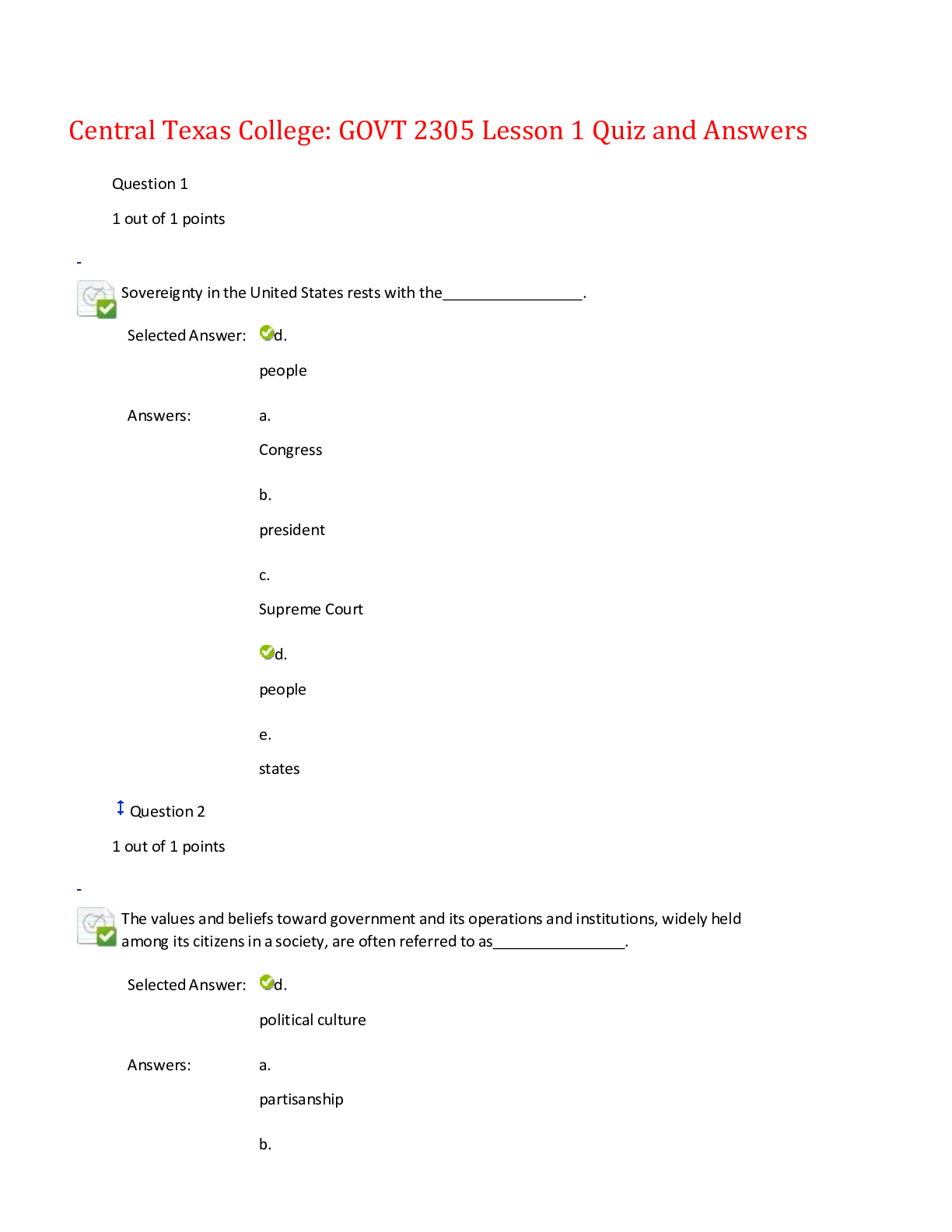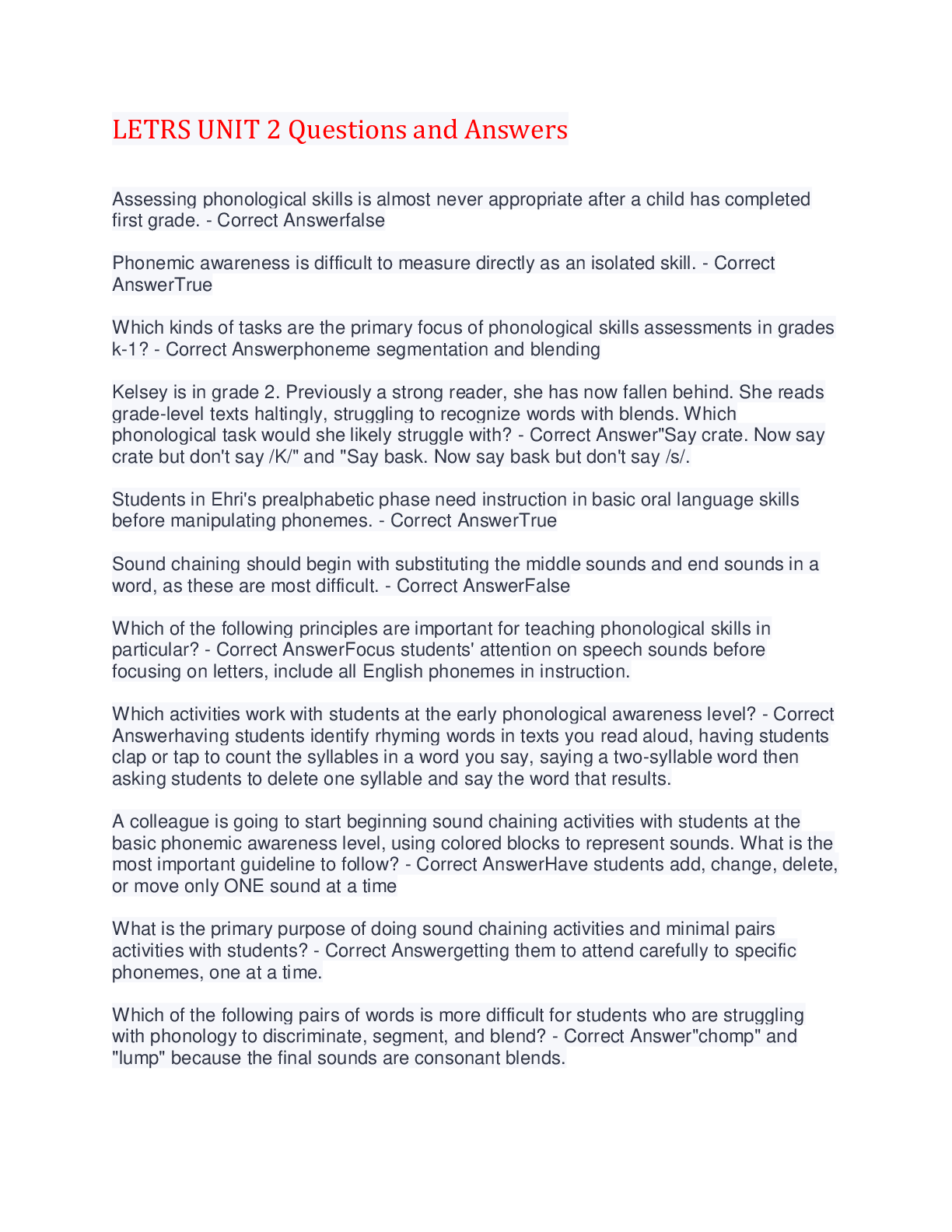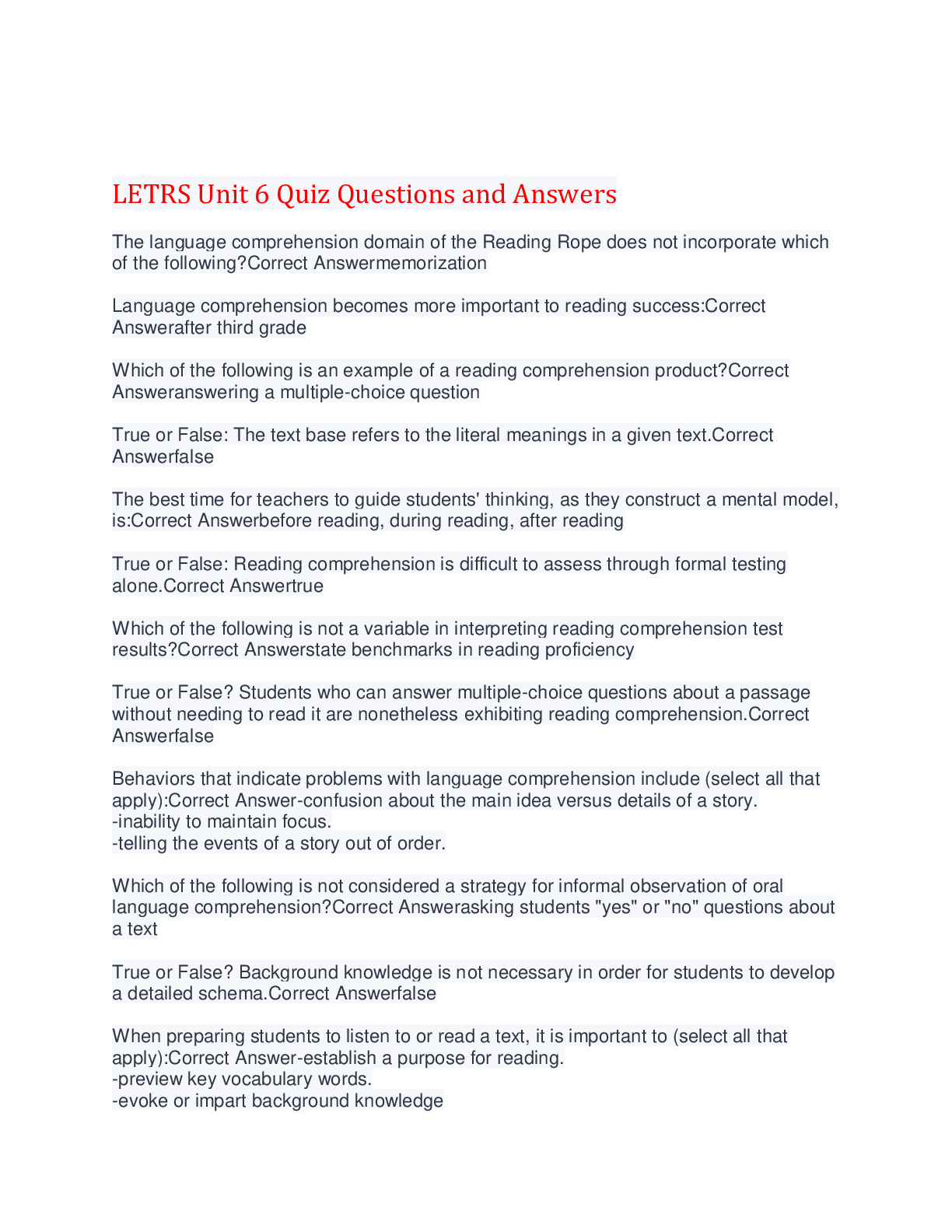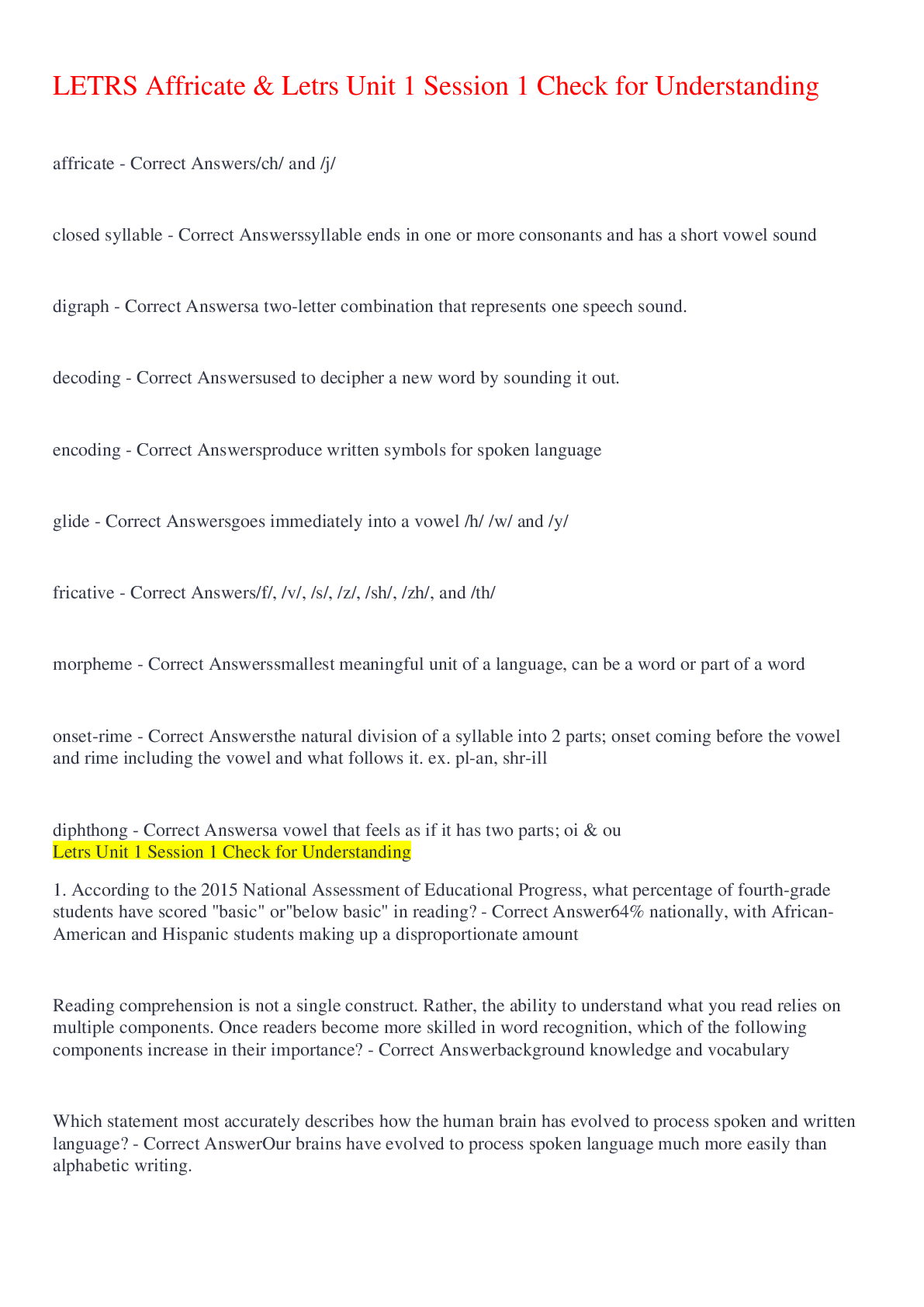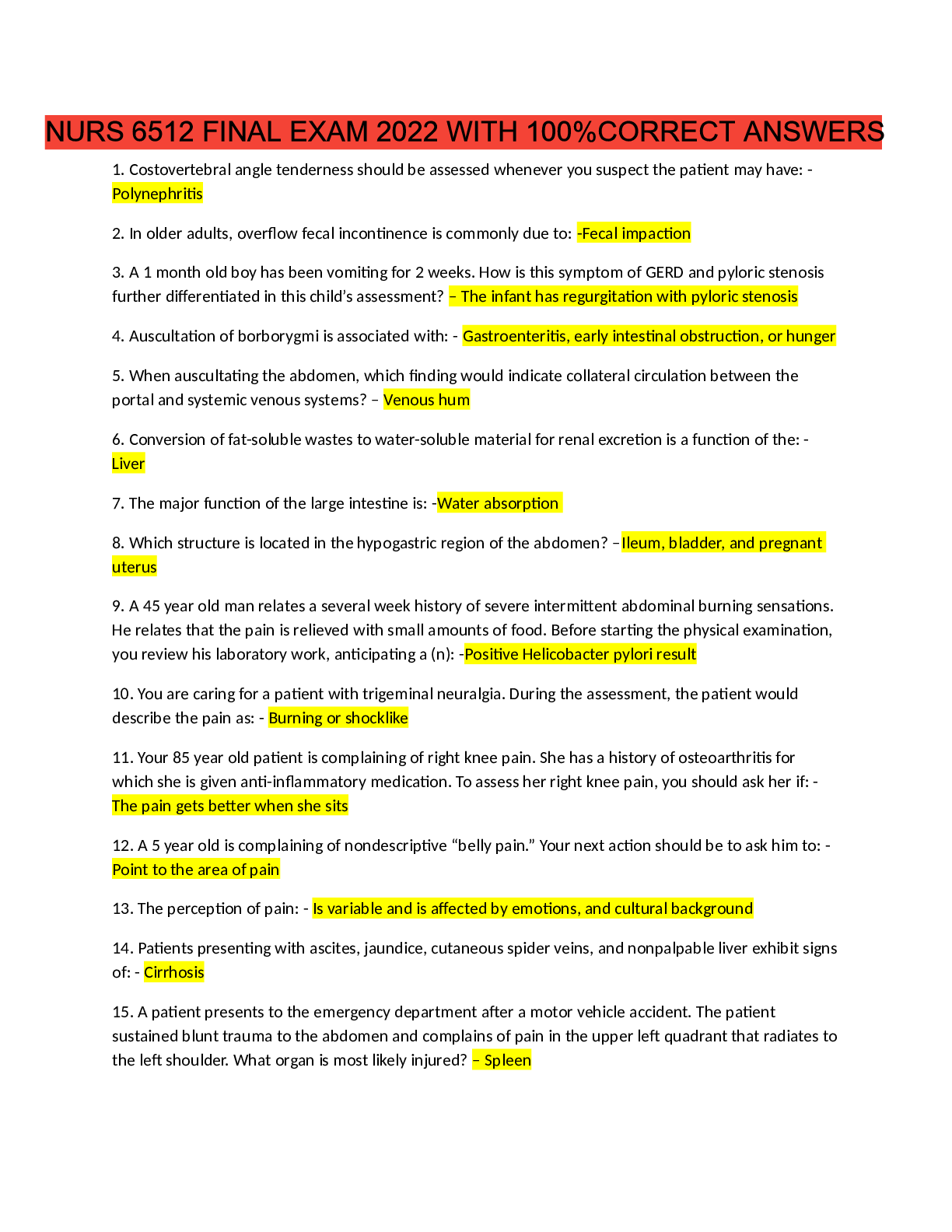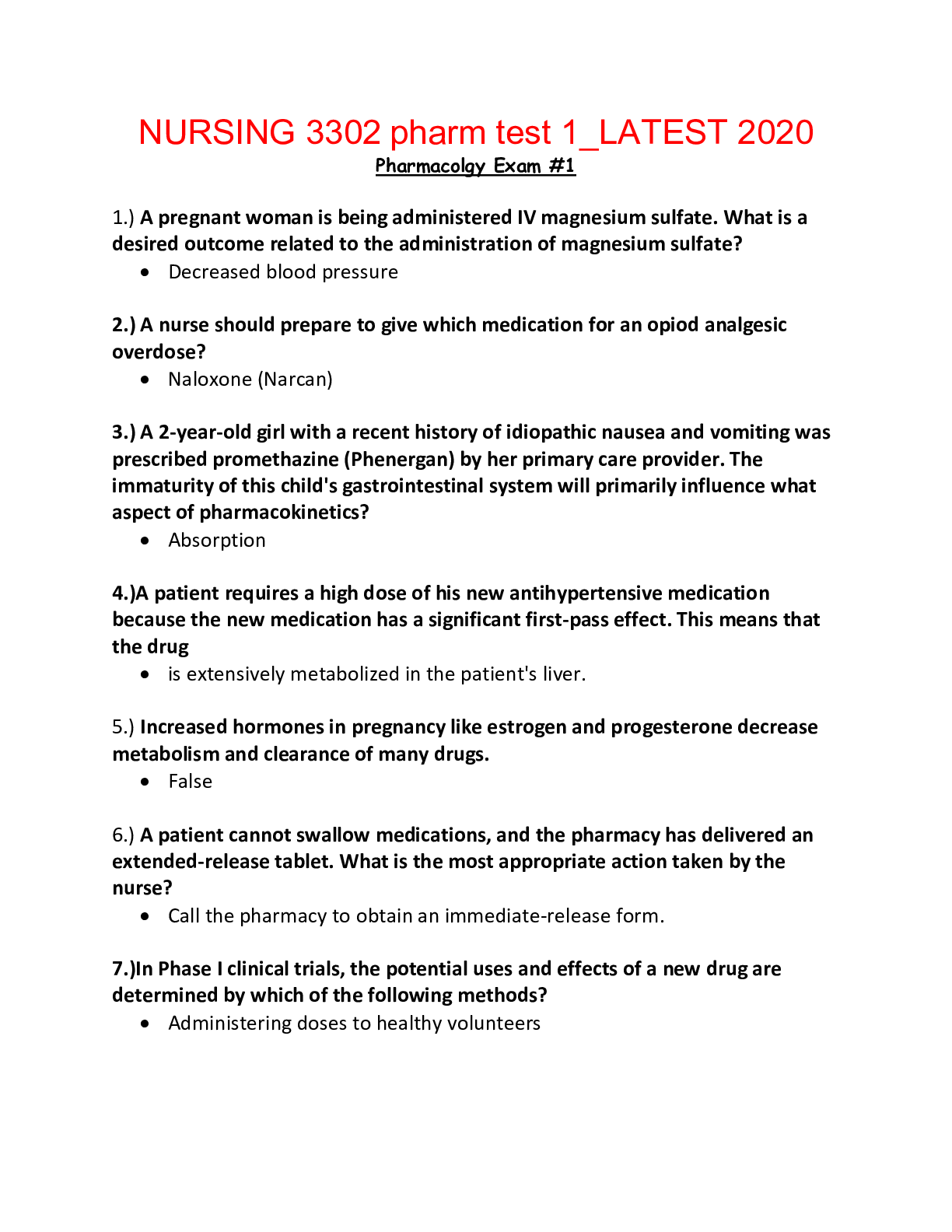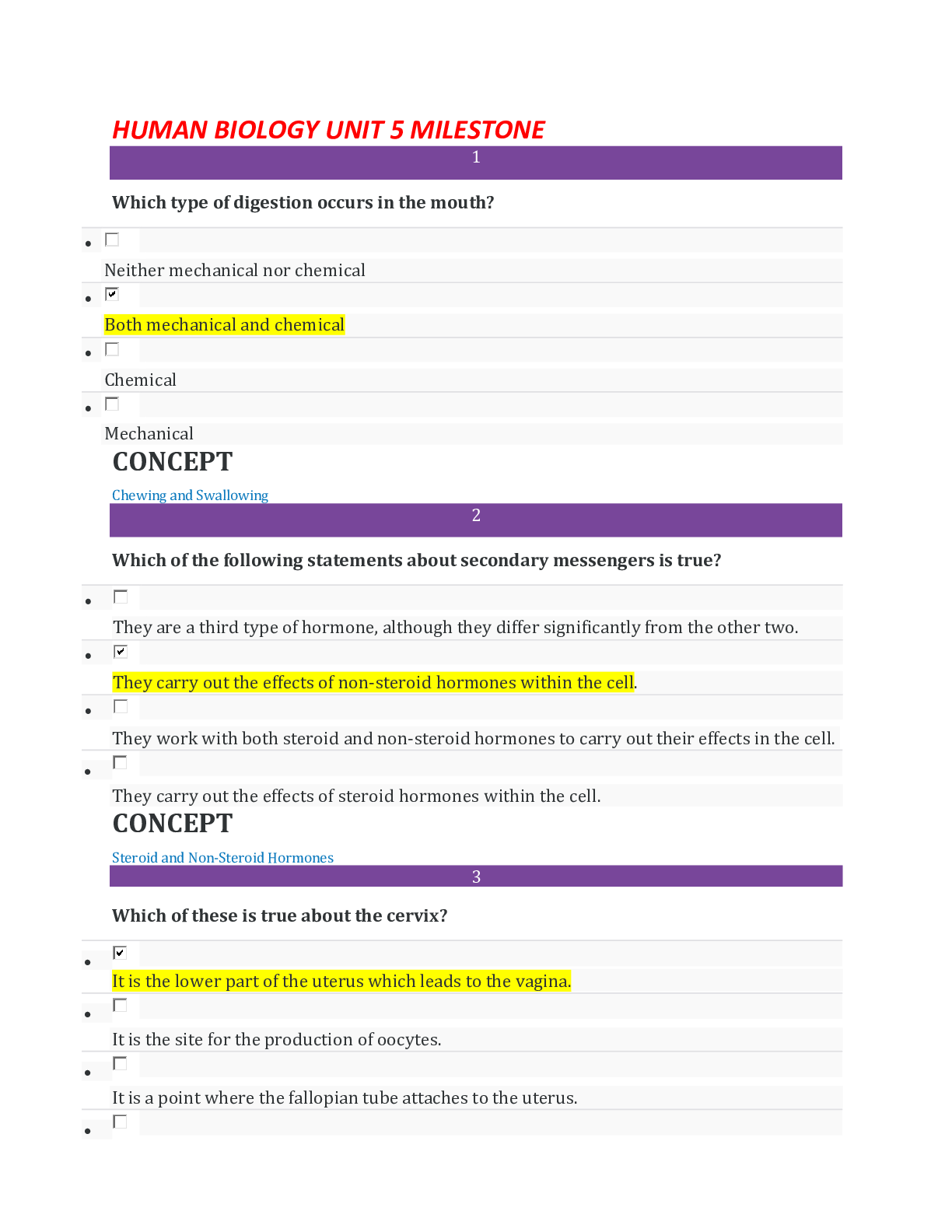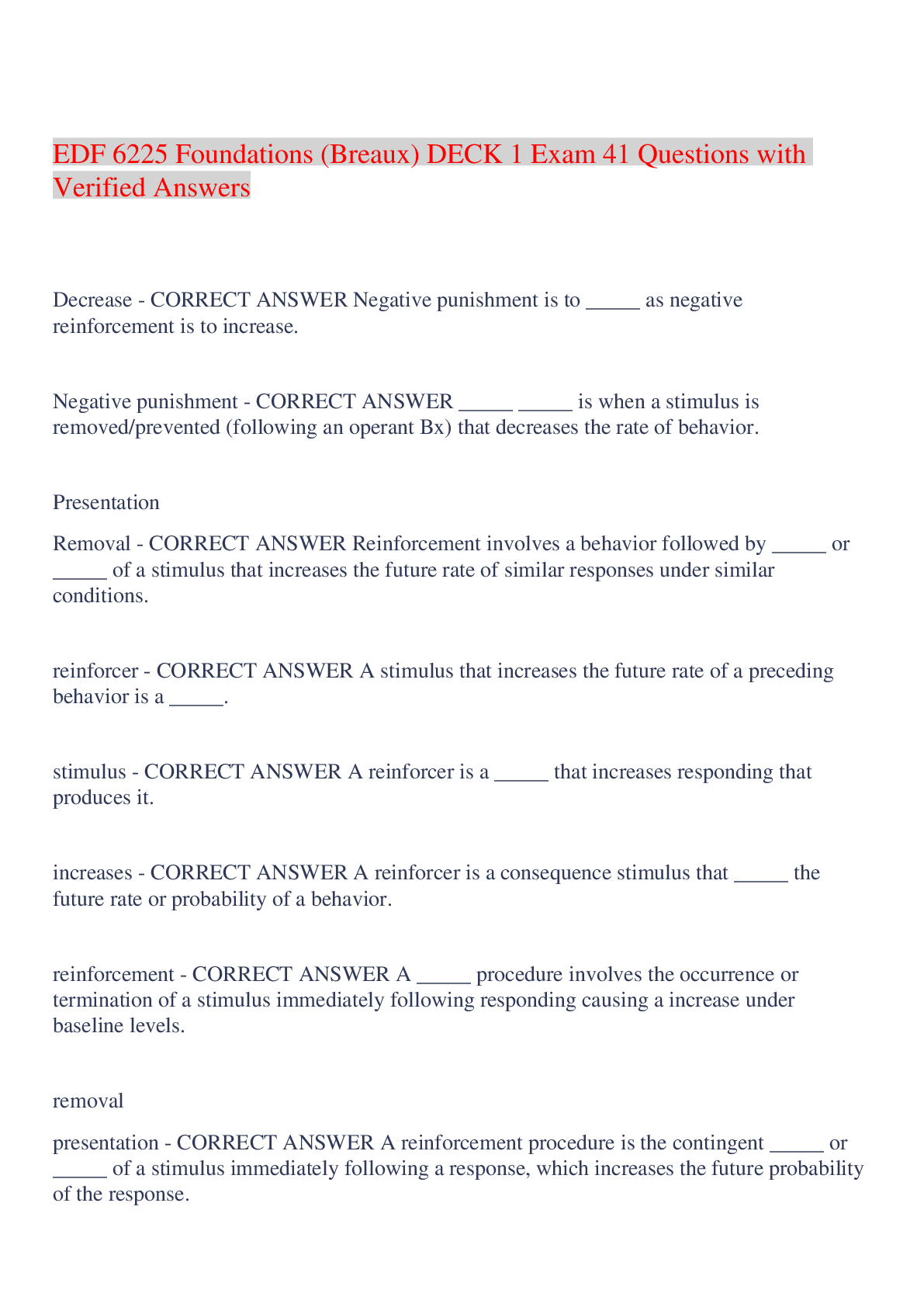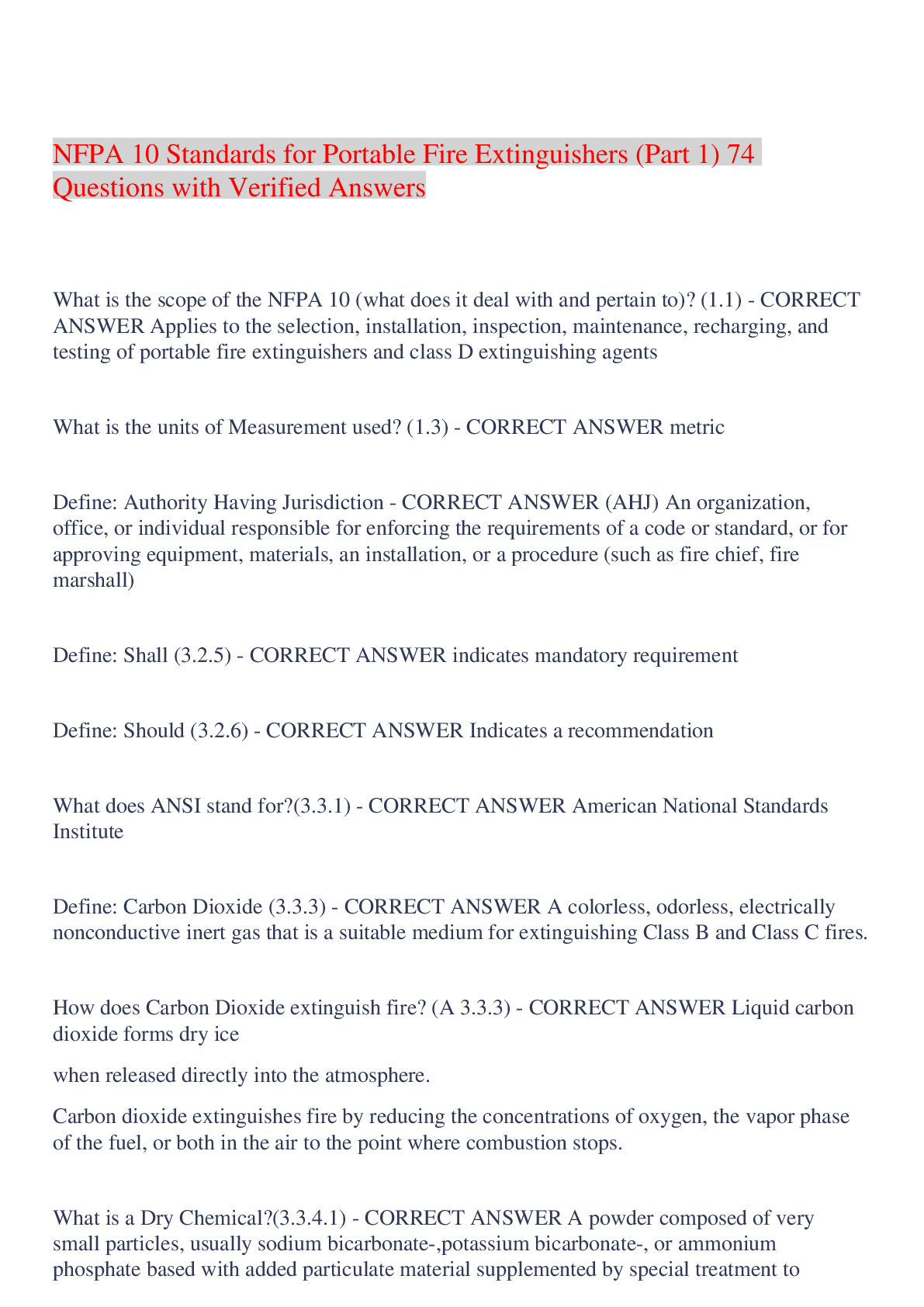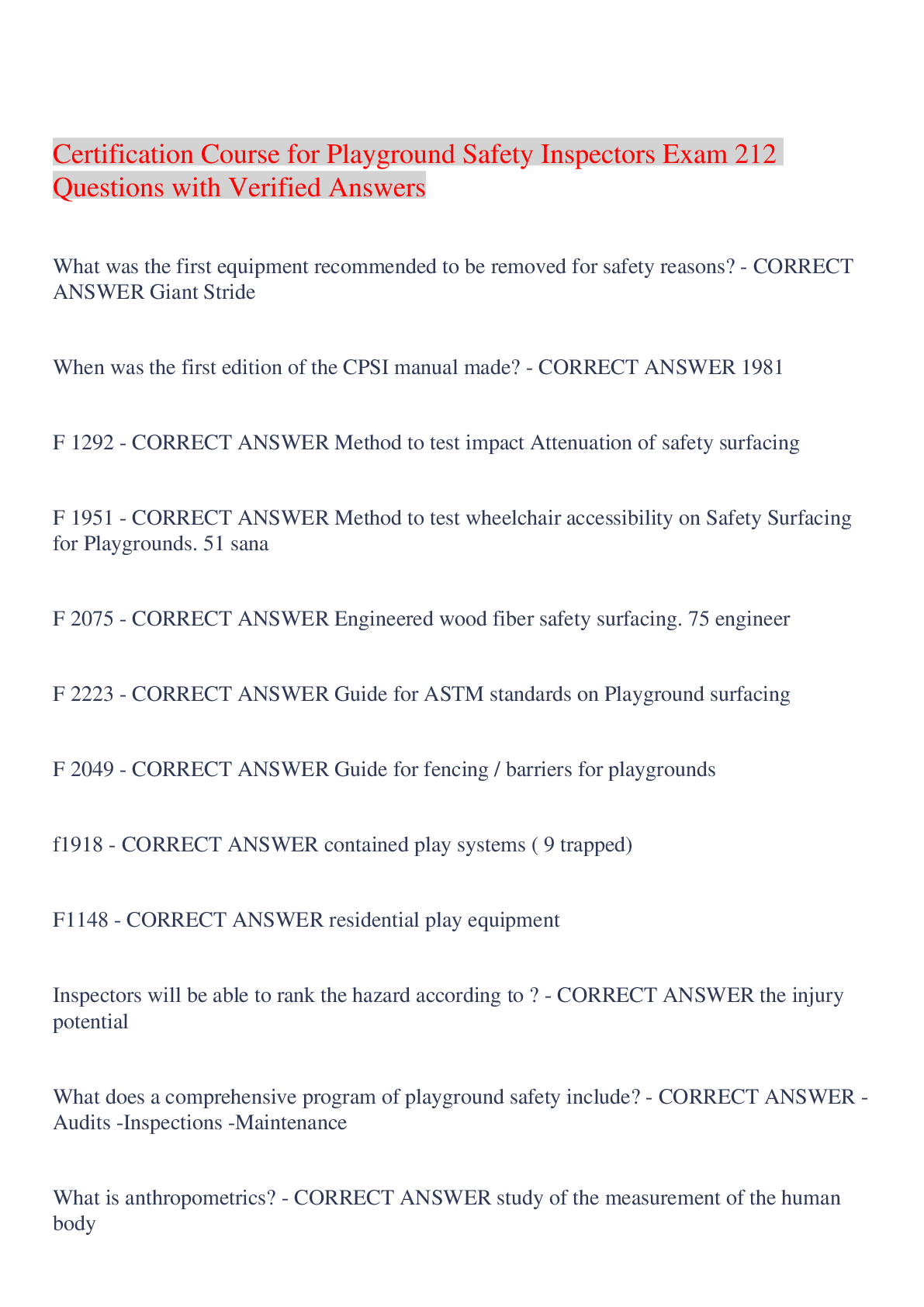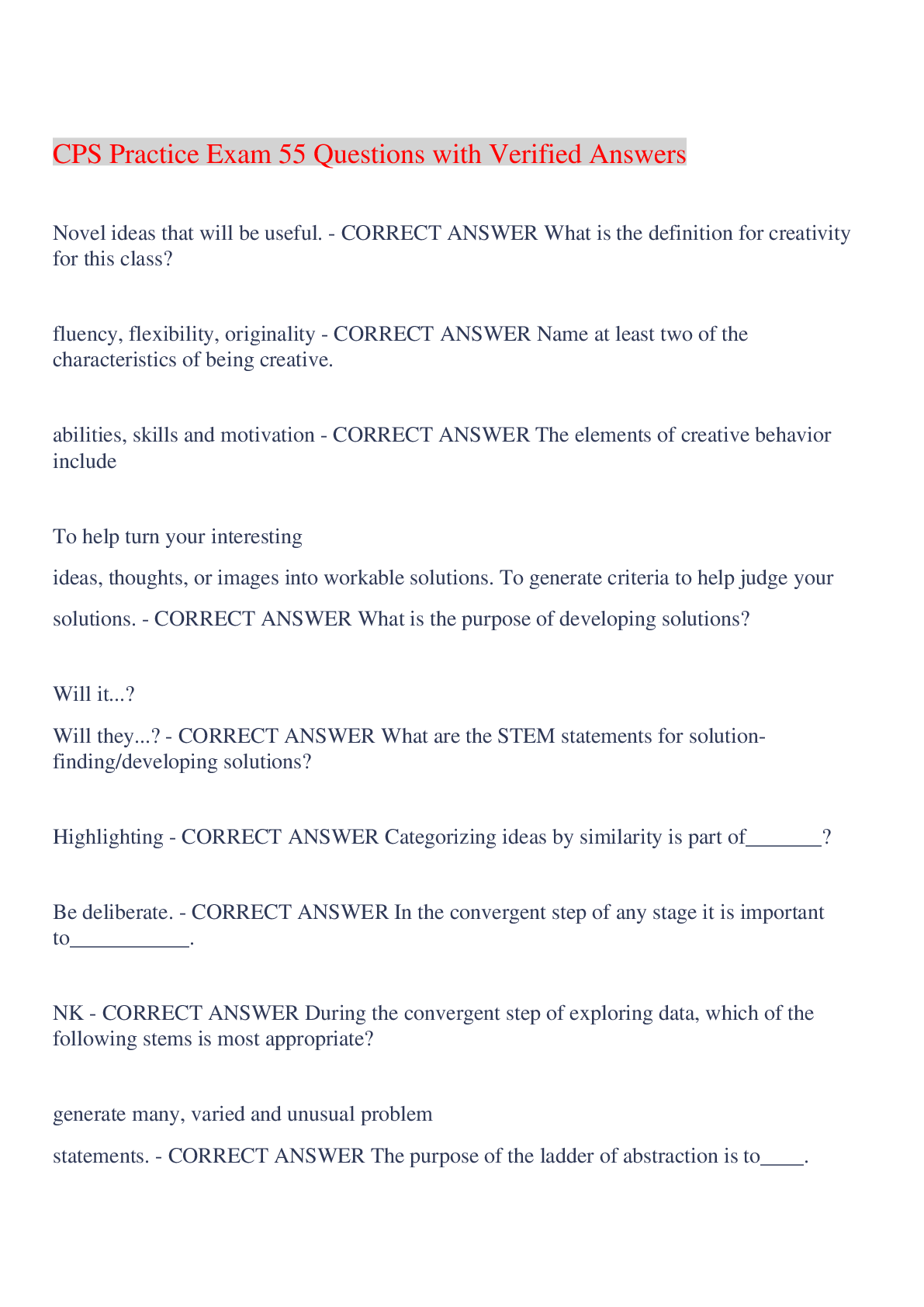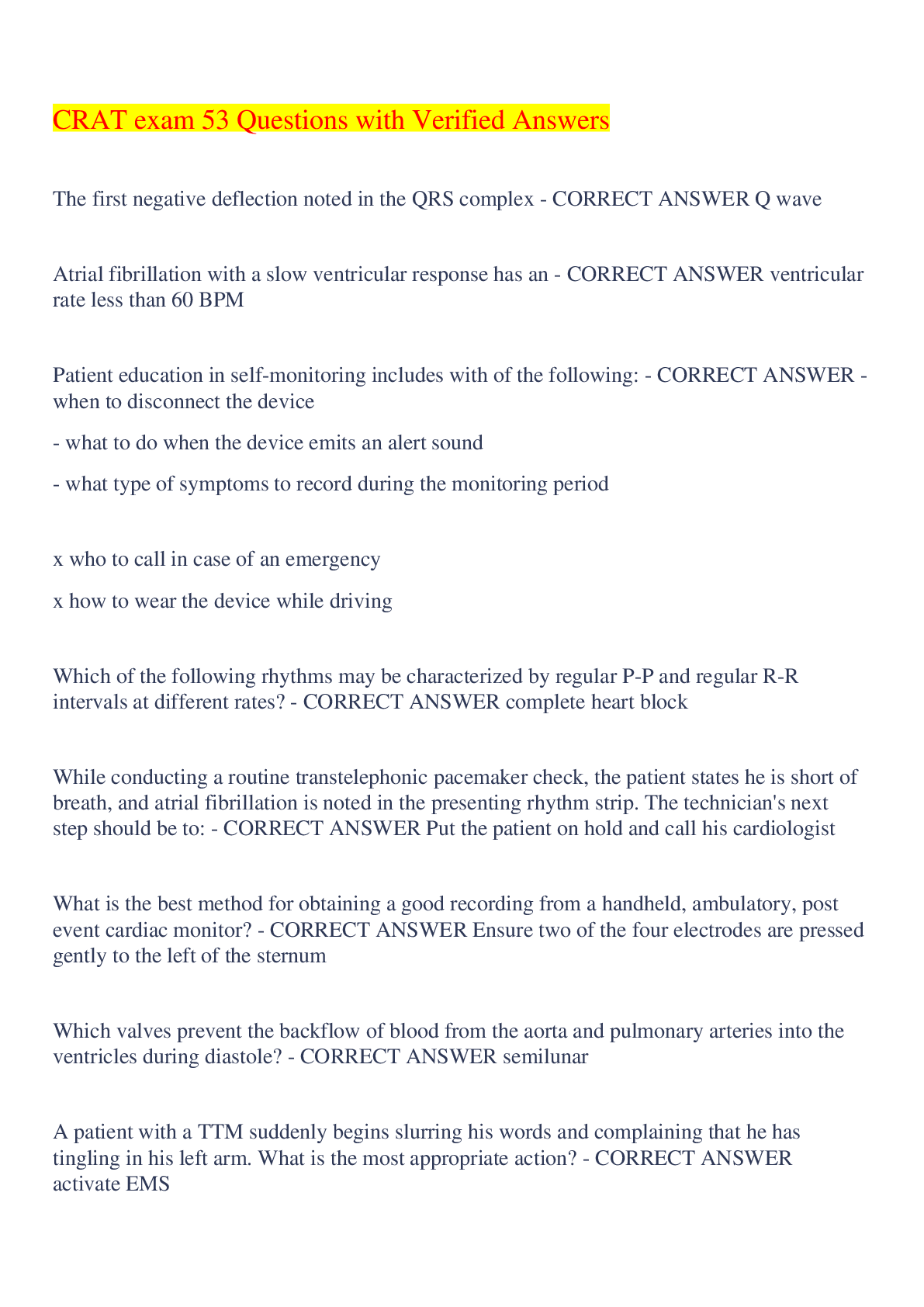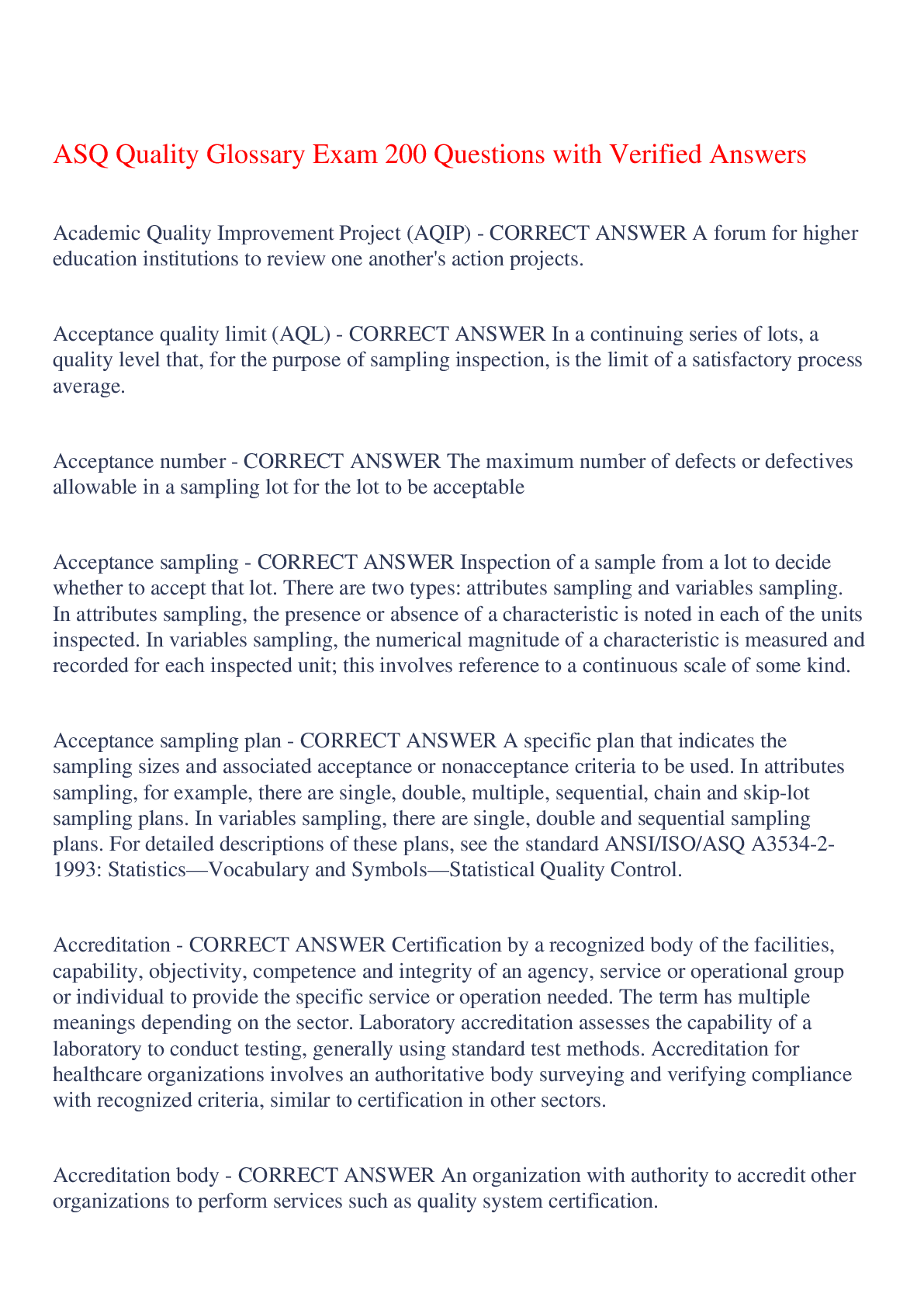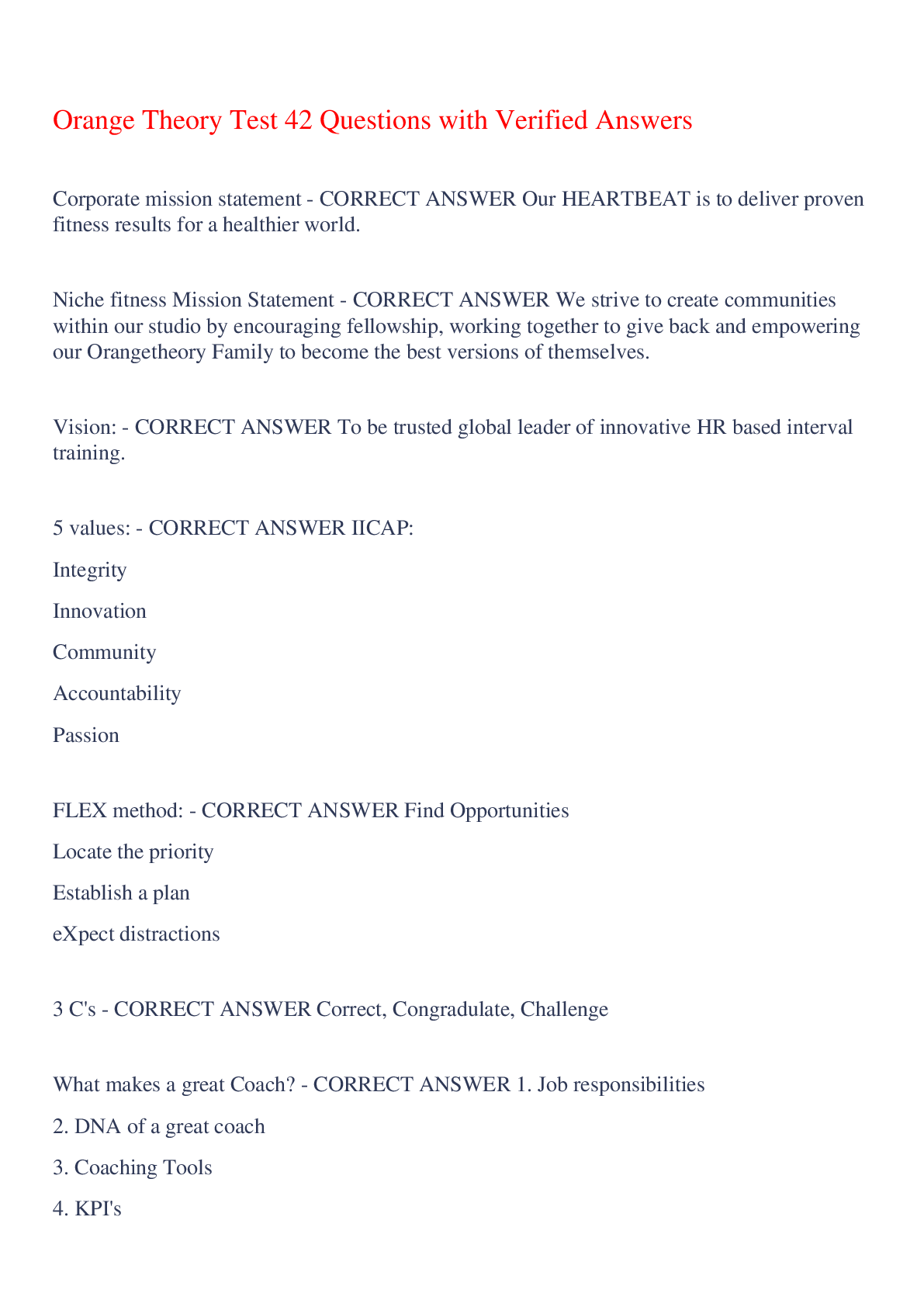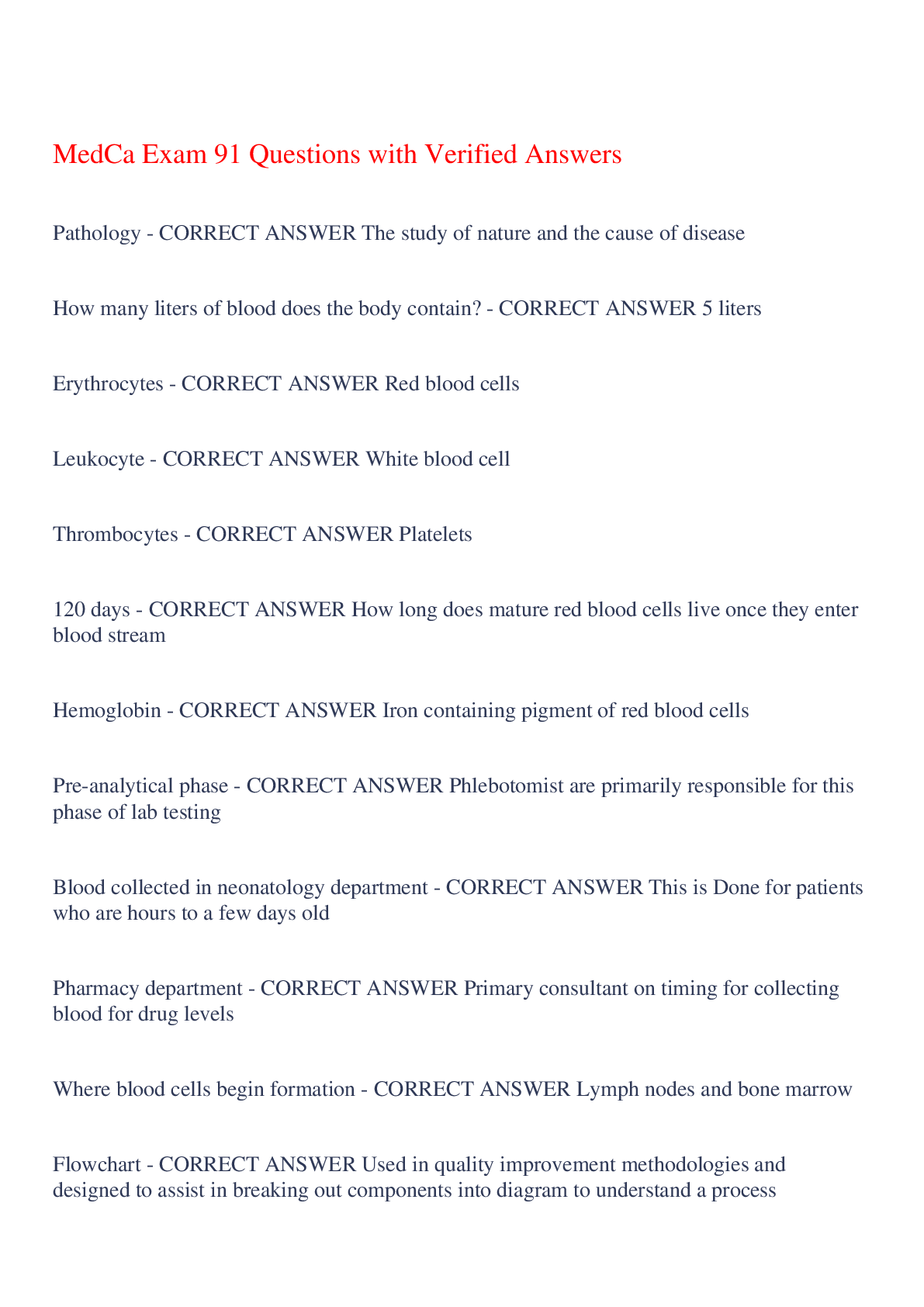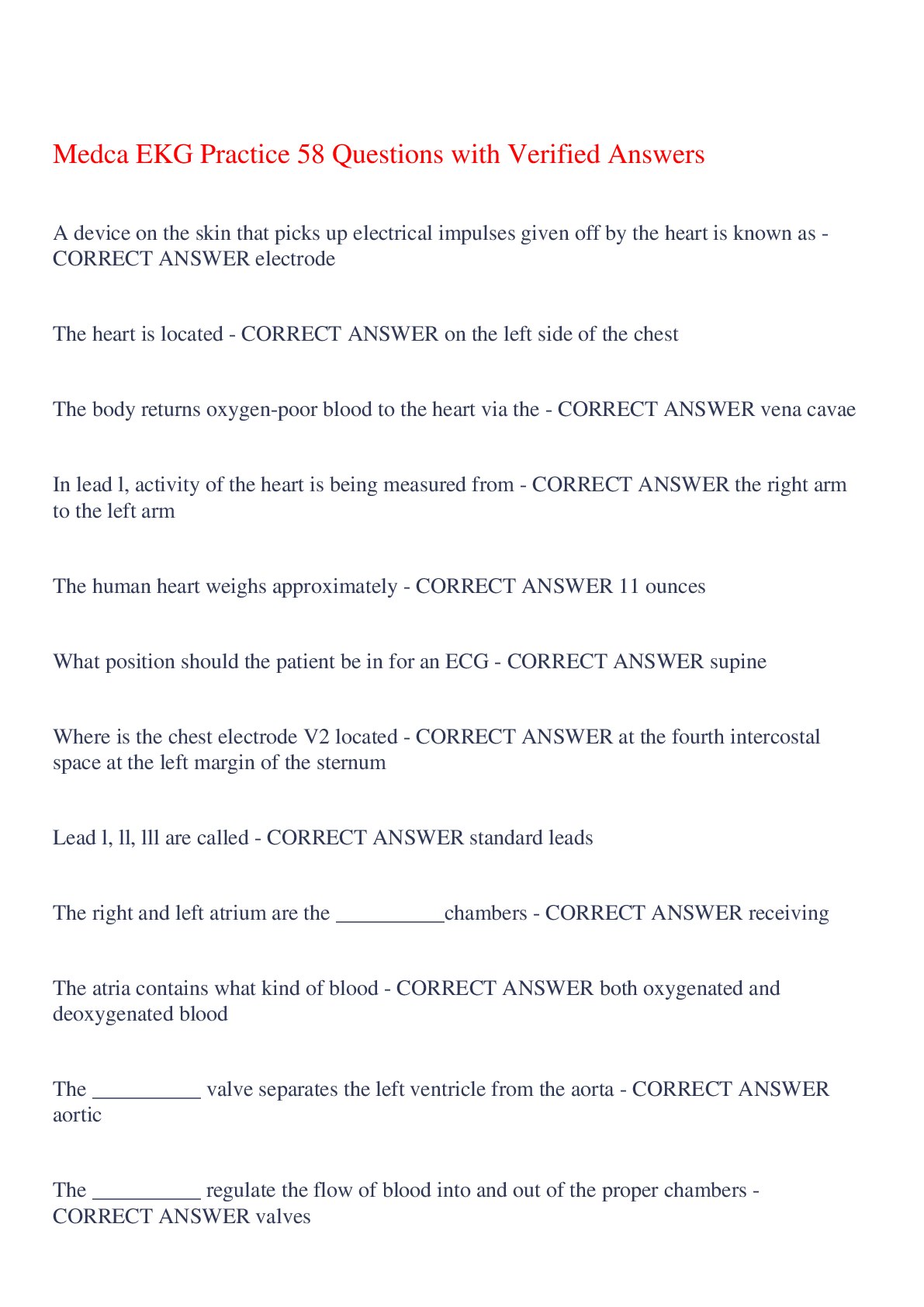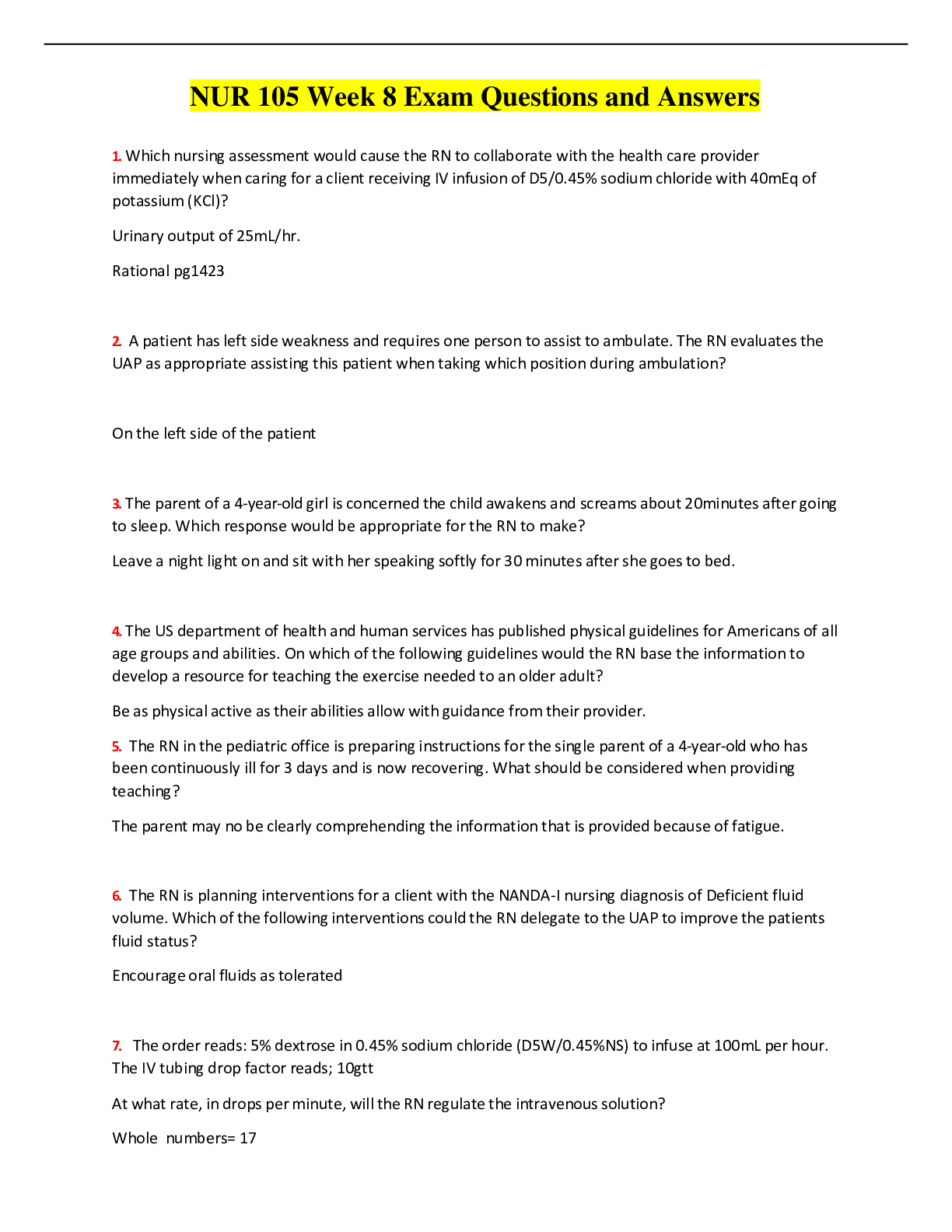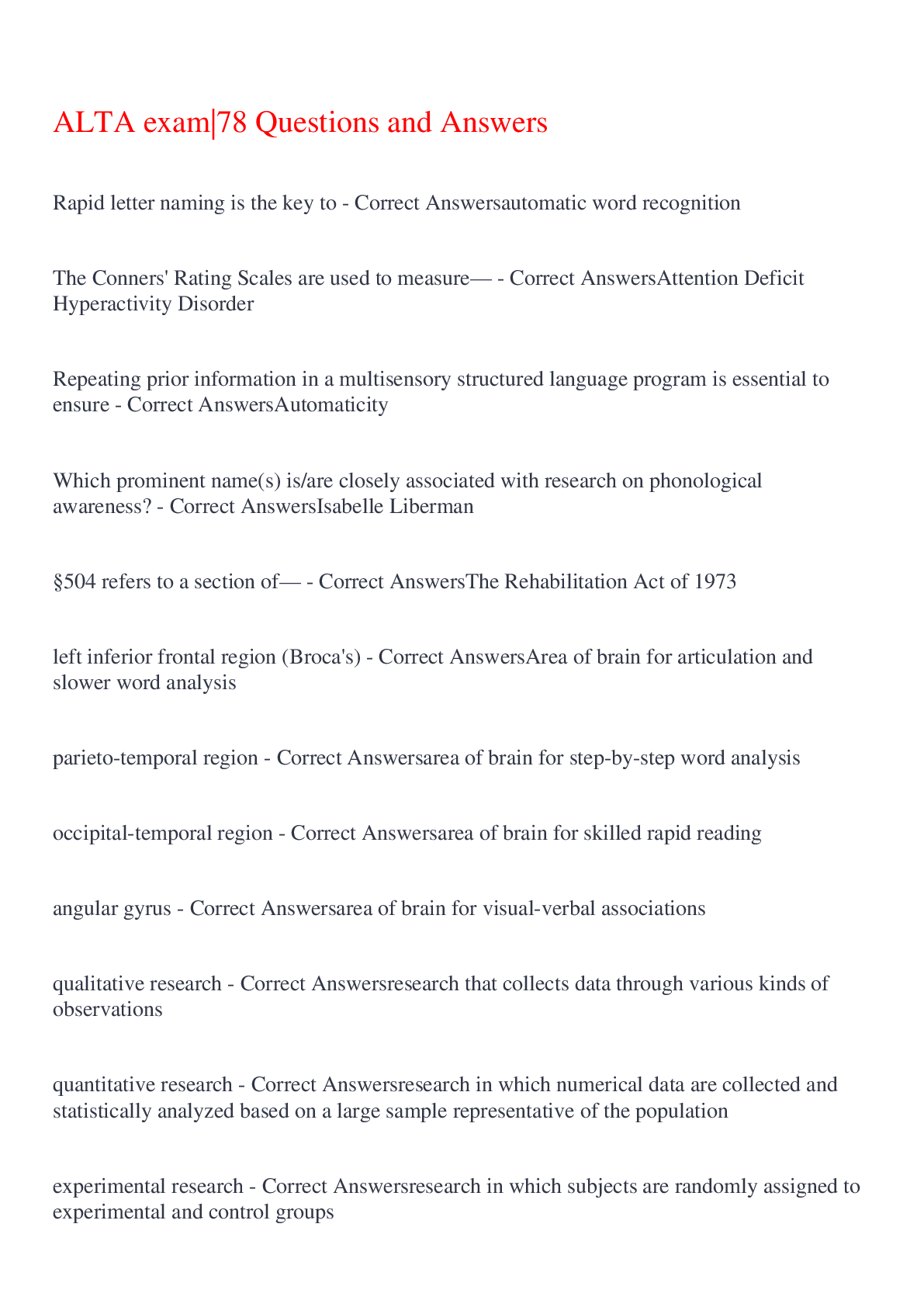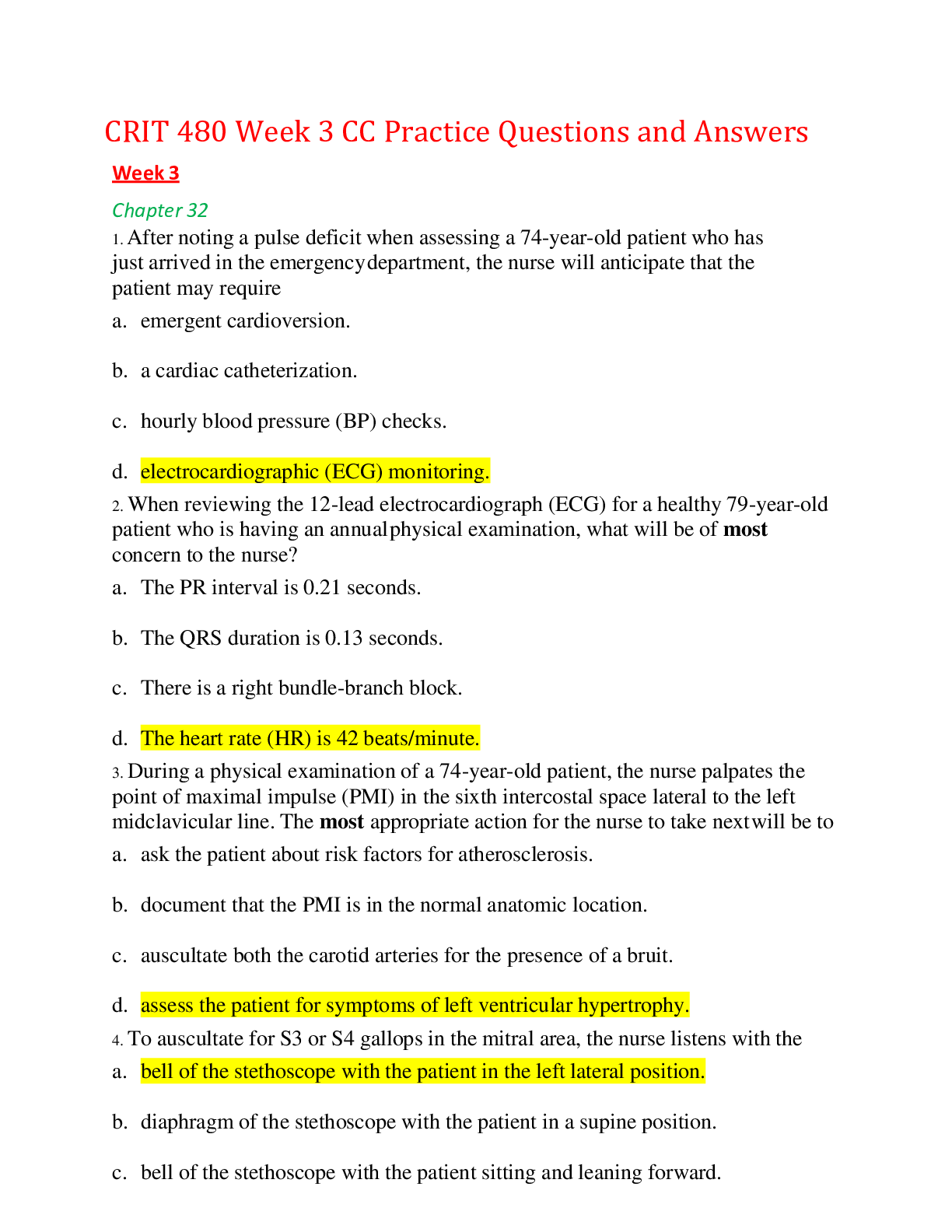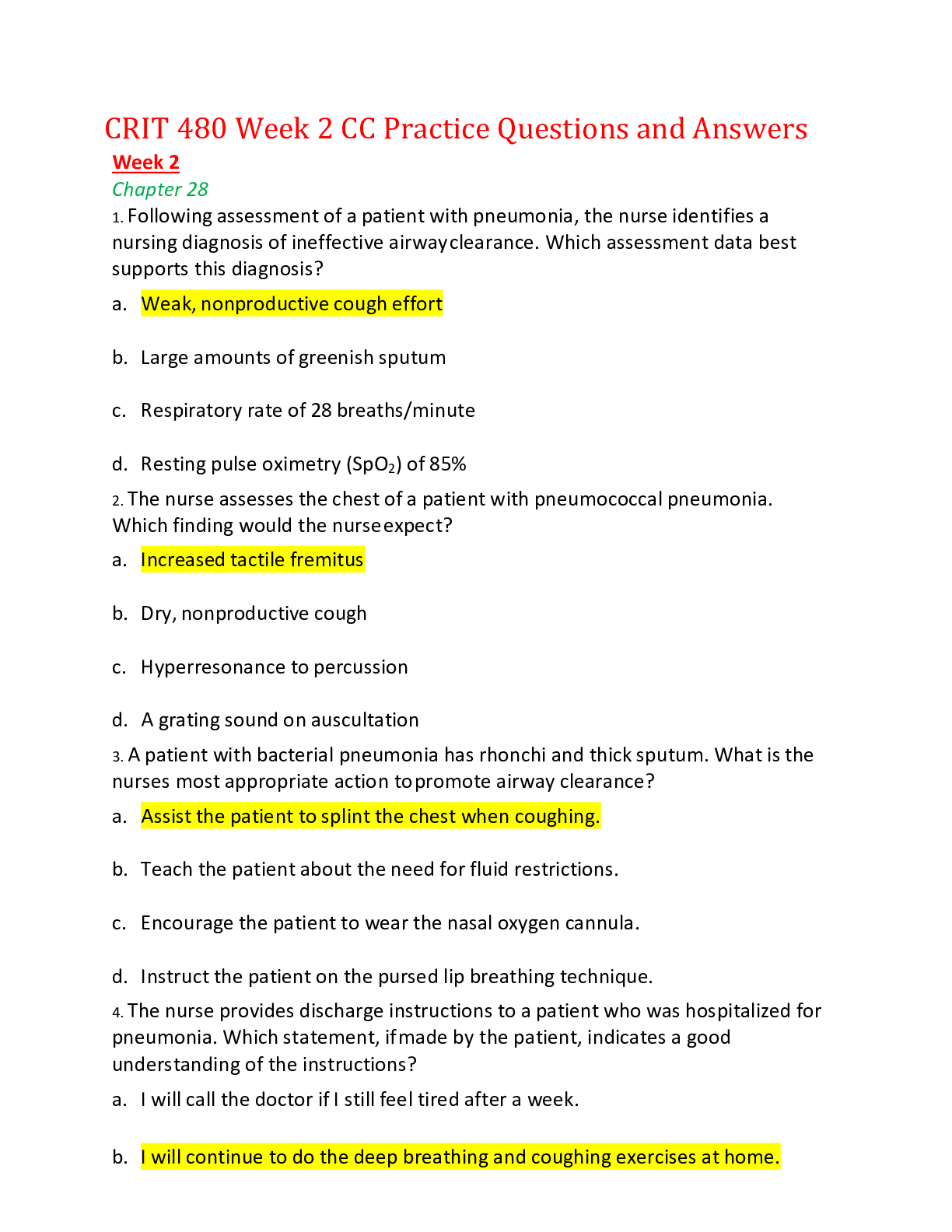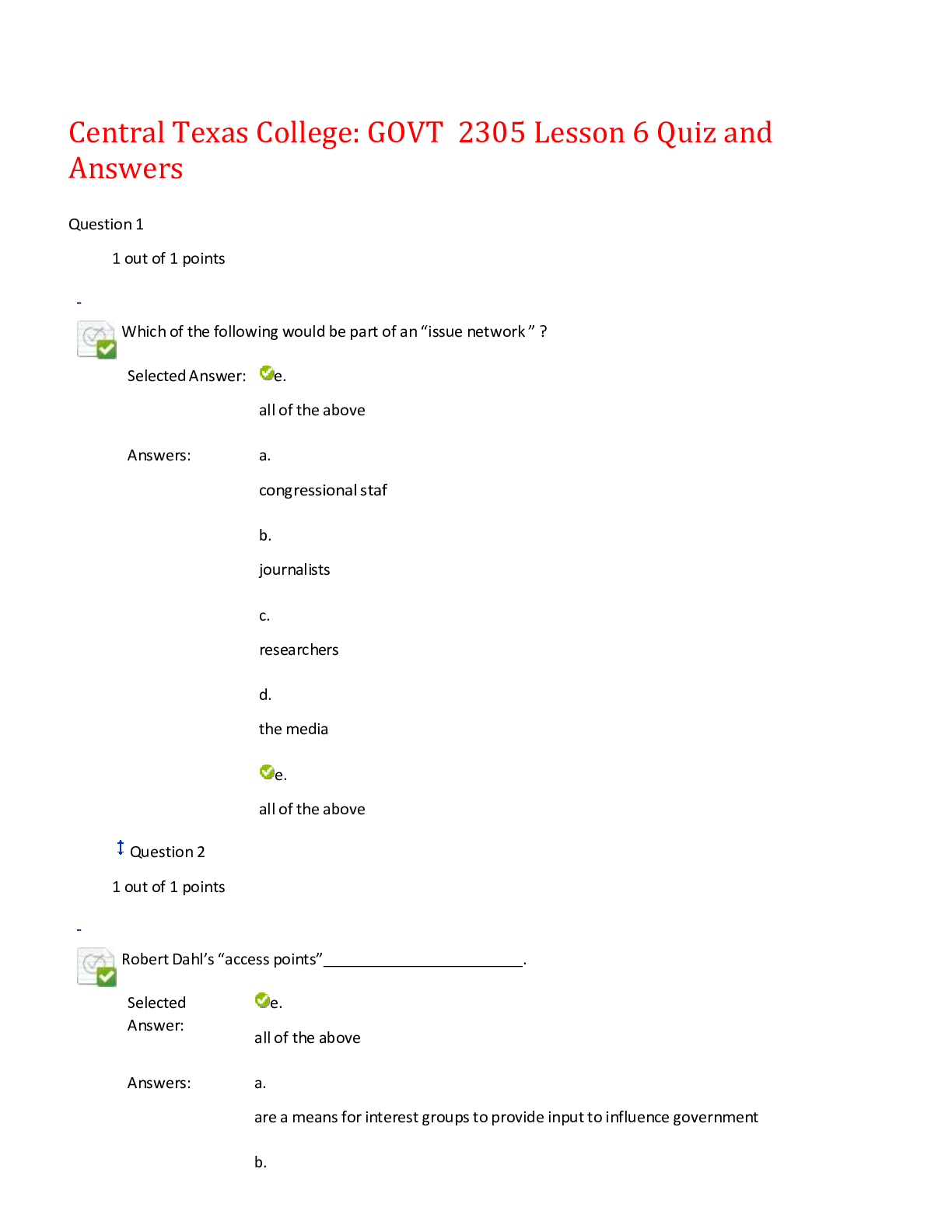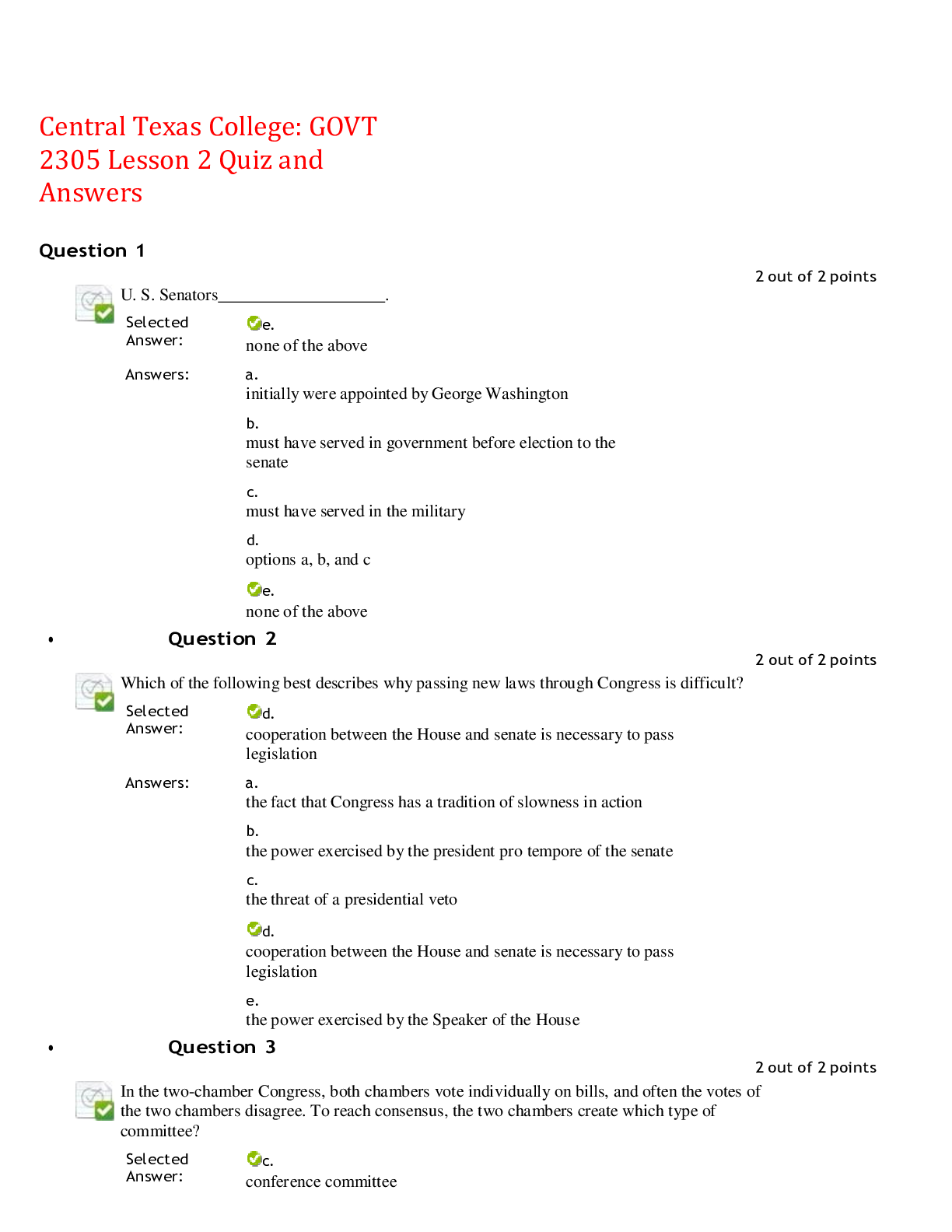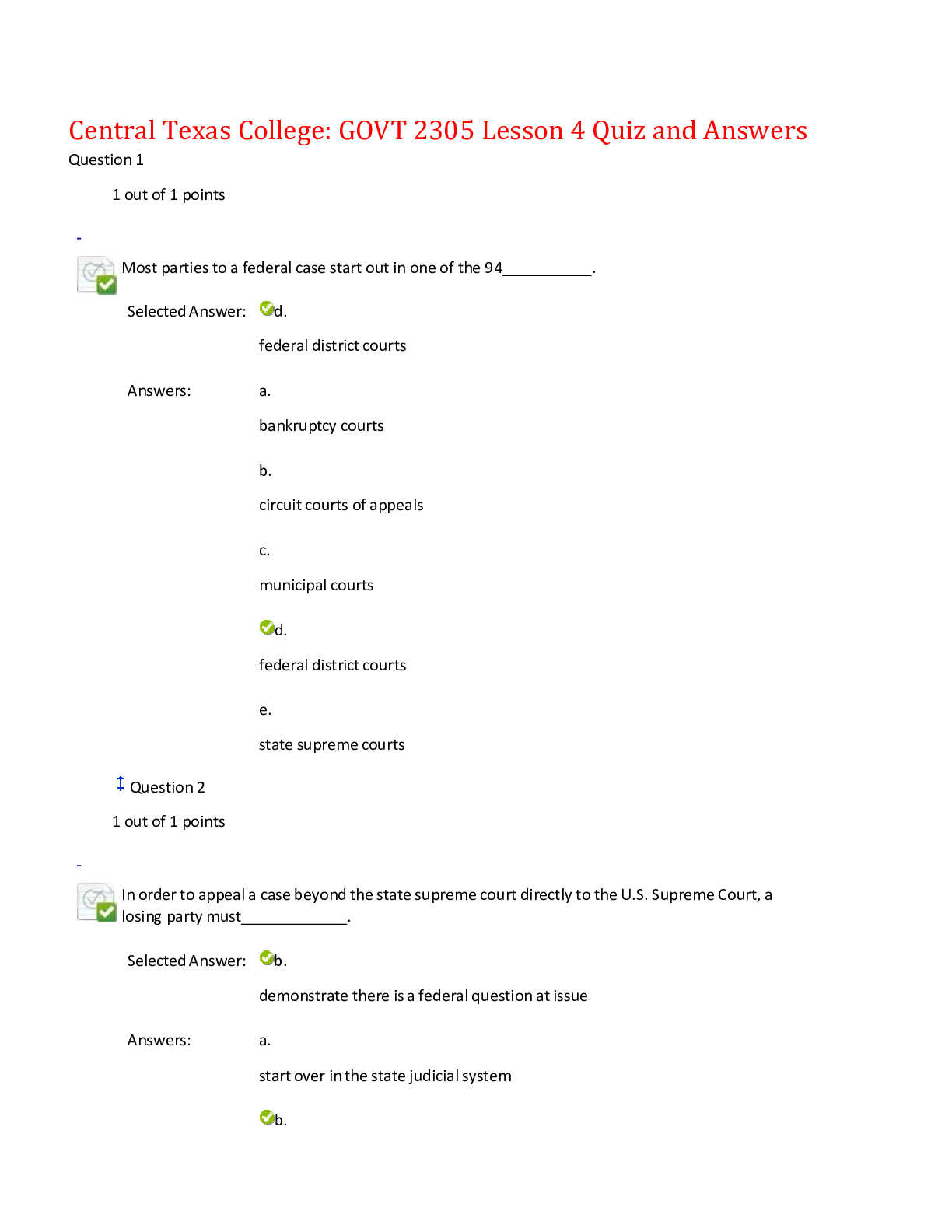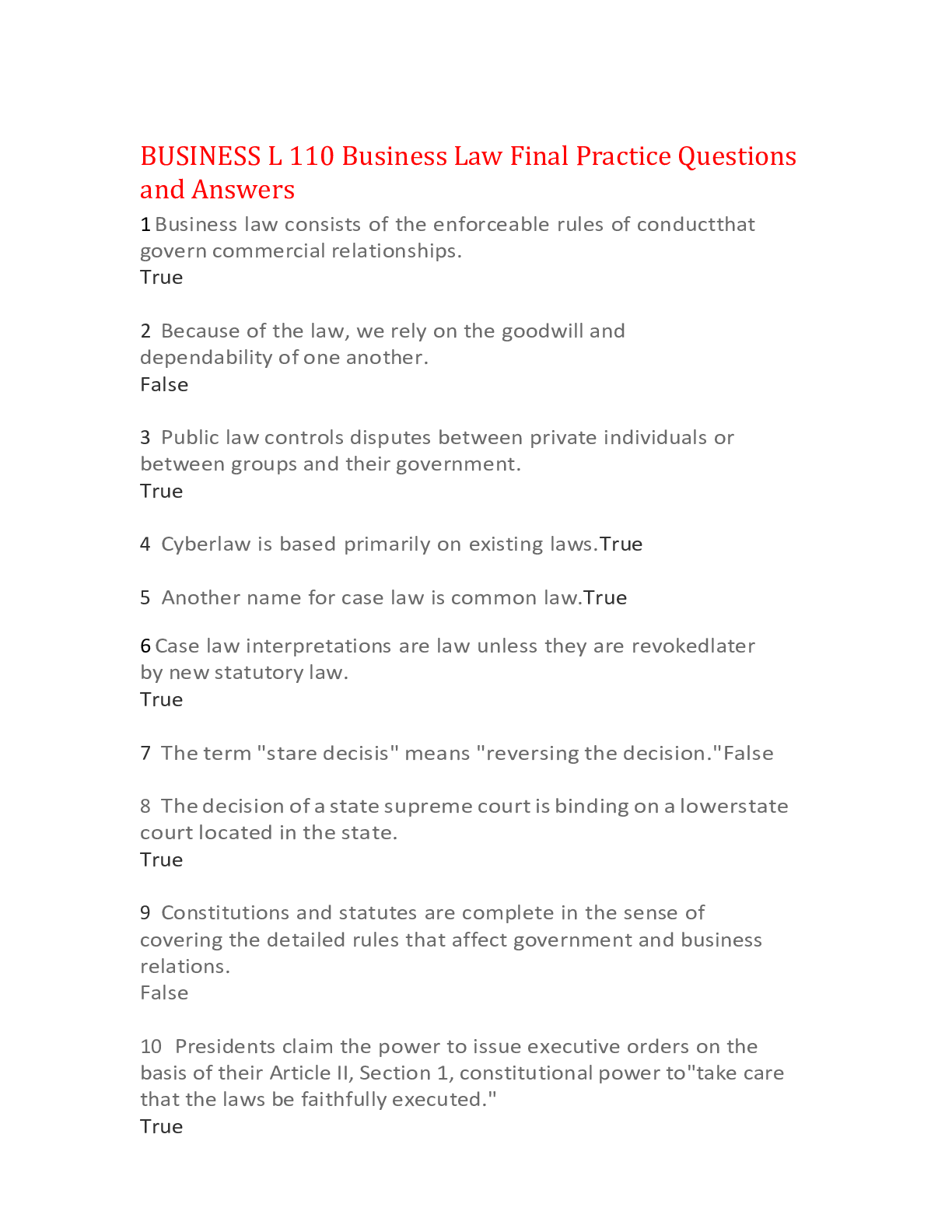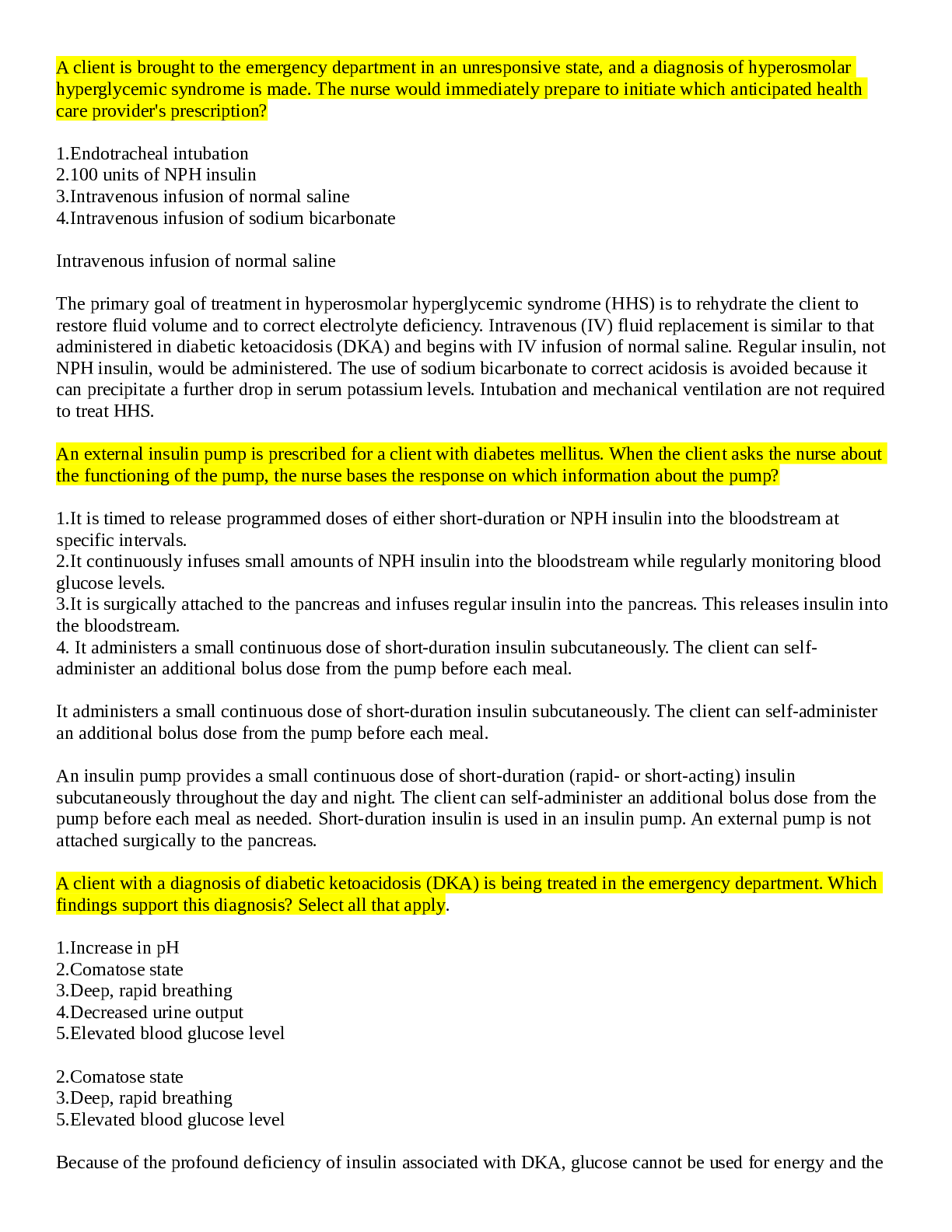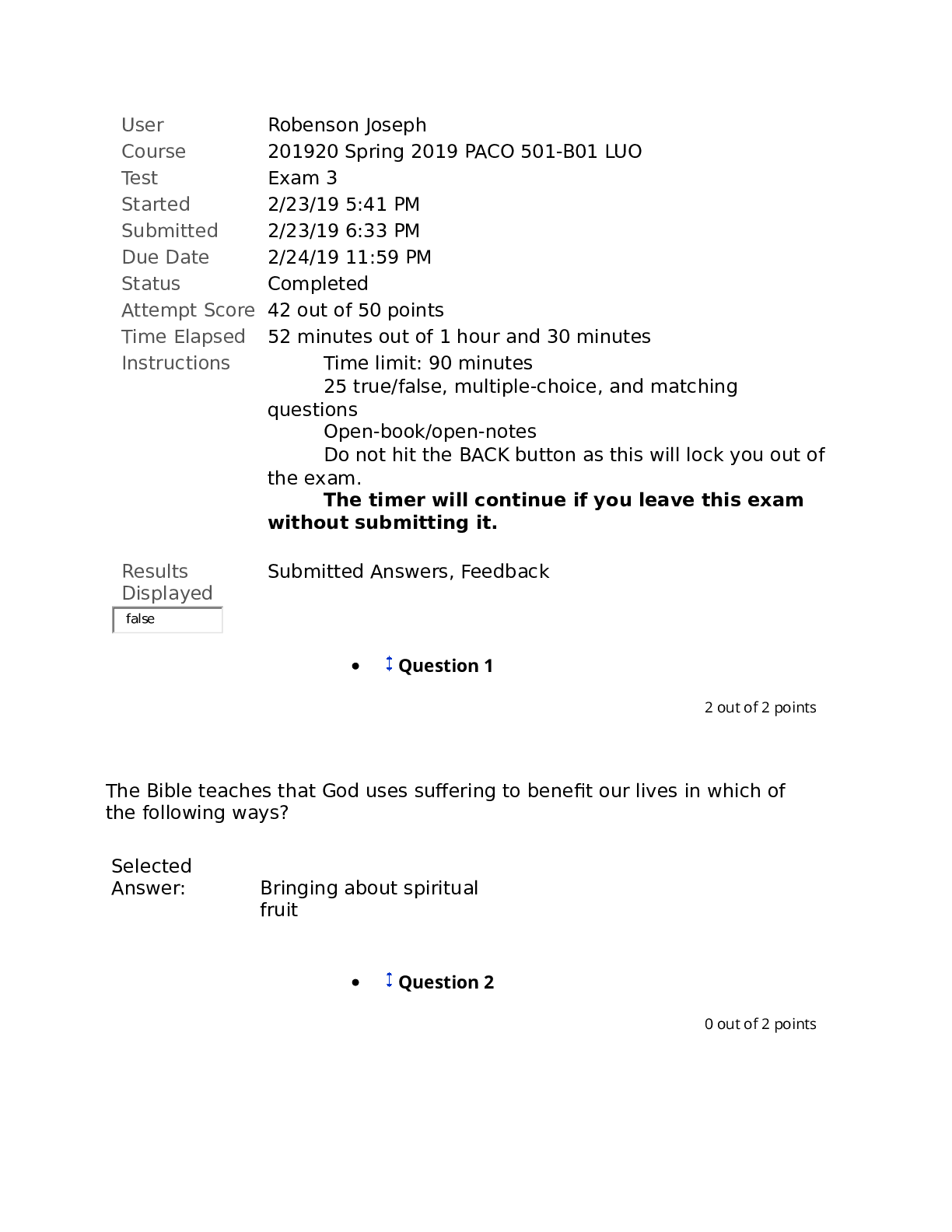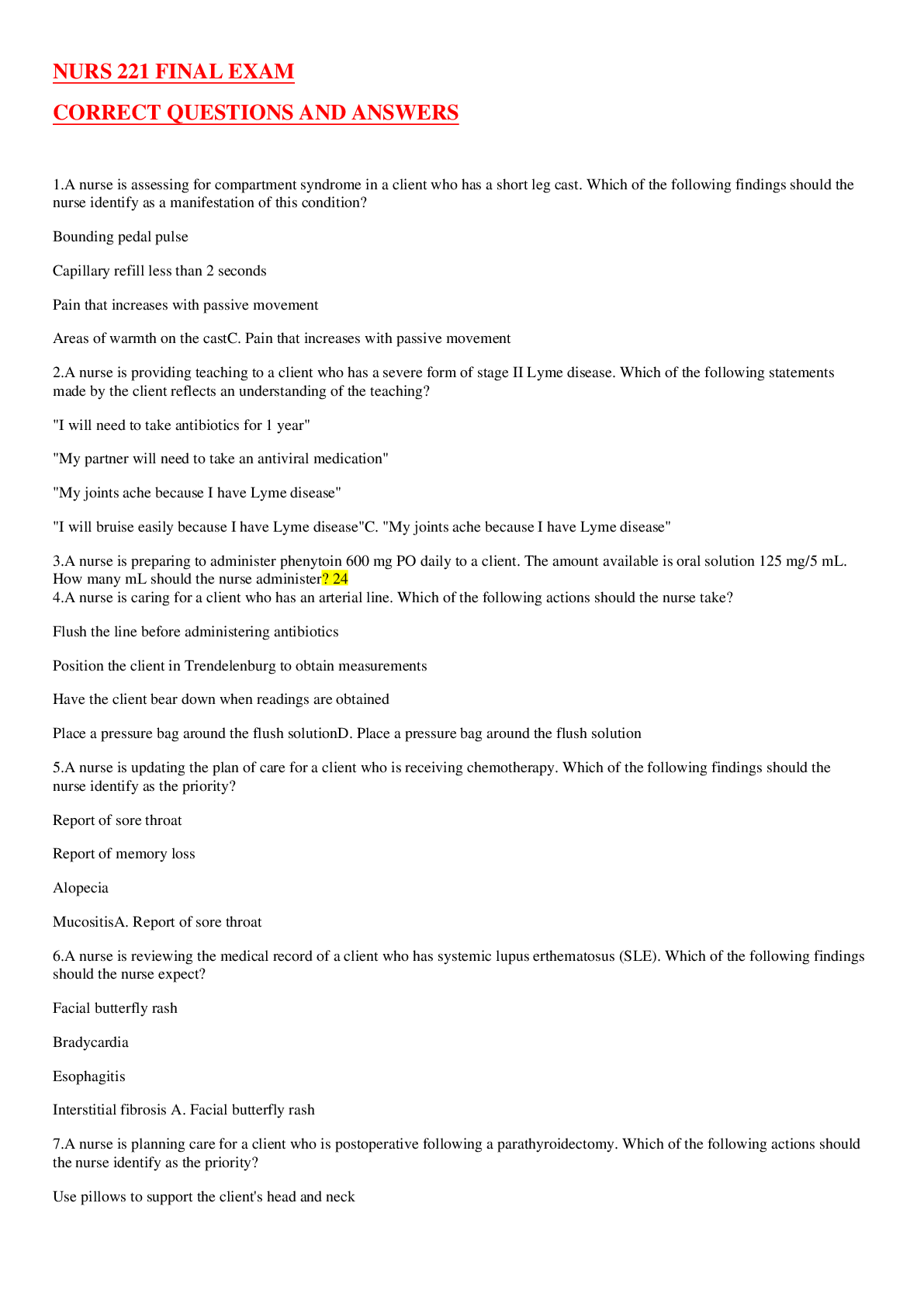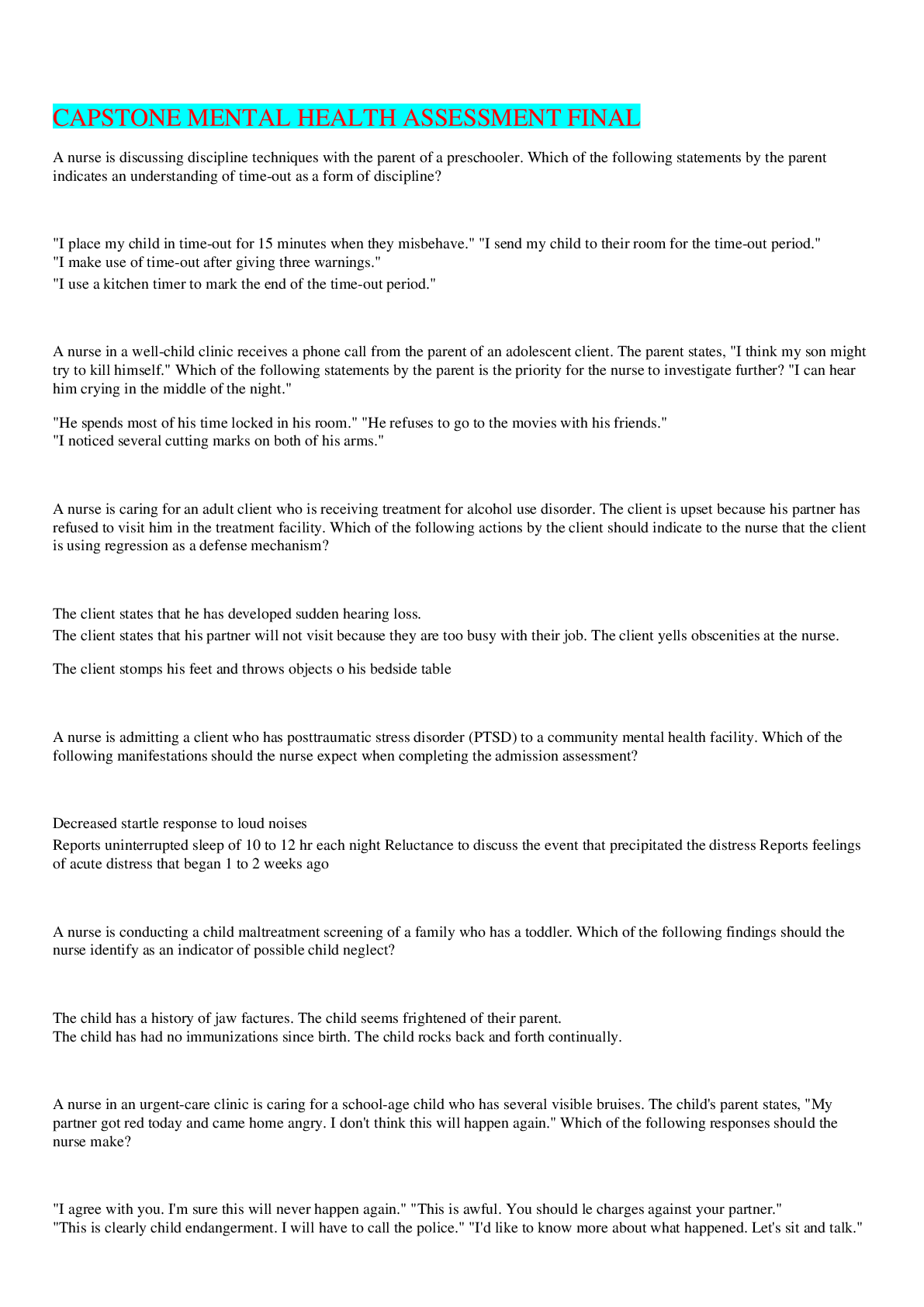Government > EXAM > Central Texas College: GOVT 2305 Lesson 3 Quiz and Answers,100% CORRECT (All)
Central Texas College: GOVT 2305 Lesson 3 Quiz and Answers,100% CORRECT
Document Content and Description Below
Central Texas College: GOVT 2305 Lesson 3 Quiz and Answers Question 1 2 out of 2 points President Johnson’s Great Society programs in the 1960s built upon President Roosevel... t’s New Deal programs of the 1930s as they responded to the growing prosperity in the American economy. Which of the following was not a goal of Johnson’s policies? Selected Answer: a. to force the state governments to assume the responsibility for social assistance Answers: a. to force the state governments to assume the responsibility for social assistance b. to greatly expand educational opportunities for all Americans c. to create a safety net for the poor d. to provide health care for the elderly e. to promote social justice • Question 2 The federal bureaucracy is made up of a variety of agencies. The 15 major administrative organizations within the bureaucracy that report directly to the president are called . 0 out of 2 points Selected Answer: d. mini-bureaucracies Answers: a. judicial branches b. state governments c. cabinet departments d. mini-bureaucracies e. administrative units • Question 3 The Bureau of Labor was created . 2 out of 2 points Selected Answer: e. as a response to workers’ concerns that arose with the growth of the industrial economy Answers: a. to provide jobs for large numbers of the unemployed b. to respond to severe economic crises c. to deal with the nation’s fiscal woes d. to help regulate interstate and foreign trade arising from large-scale industrialization and economic development e. as a response to workers’ concerns that arose with the growth of the industrial economy • Question 4 Which of the following was a factor that accounted for the significant growth in the federal bureaucracy between 1940 and 1975? 2 out of 2 points Selected Answer: c. Johnson’s Great Society program Answers: a. the addition of the Department of Homeland Security b. creation of the Federal Reserve c. Johnson’s Great Society program d. prohibition e. devolution • Question 5 What is meant by “administrative discretion”? 0 out of 2 points Selected Answer: a. An agency is not bound by a written law and may adapt its procedures to meet a particular circumstance. Answers: a. An agency is not bound by a written law and may adapt its procedures to meet a particular circumstance. b. When laws are vague, a federal agency usually has considerable freedom in deciding how to implement them. c. The president may hold as confidential the conversations between himself and his cabinet. d. The federal courts have considerable oversight ability and latitude to steer an agency. e. Having enacted the legislation, Congress has reserved the right to create administrative guidelines for an agency. • Question 6 2 out of 2 points An ongoing debate in American government is the question of which level of government should have the authority to provide programs and services to citizens. Beginning in the 1980s, many of the services provided by the federal government were relinquished to the state governments. This process is known as . Selected Answer: c. devolution Answers: a. reinvention b. deregulation c. devolution d. revolution e. privatization • Question 7 What is meant by “administrative law”? 2 out of 2 points Selected Answer: c. laws that relate specifically to the authority of an administrative agency, are created by that agency, and carry the enforceability of law Answers: a. ethical standards for agency employees including all managers and administrators b. court opinions that carry the weight of law based on Supreme Court rulings that have stood over time c. laws that relate specifically to the authority of an administrative agency, are created by that agency, and carry the enforceability of law d. laws in which Congress dictates how an agency head will conduct his or her business e. laws created by the president that all federal agencies must follow but state agencies may disregard in certain cases • Question 8 The Federal Emergency Management Agency (FEMA) is currently a primary unit of which agency? 2 out of 2 points Selected Answer: c. Department of Homeland Security Answers: a. Department of Defense b. Department of Commerce c. Department of Homeland Security d. Federal Bureau of Investigation e. Congressional Budget Office • Question 9 2 out of 2 points The subagency of the U.S. Department of Labor that sets policies for conduct of negotiations between employers and employees is the . Selected Answer: e. Office of Labor-Management Standards (OLMS) Answers: a. Occupational Safety and Health Administration (OSHA) b. AFL-CIO c. State Department d. Magistrate’s Court e. Office of Labor-Management Standards (OLMS) • Question 10 The Department of Justice was established to . 2 out of 2 points Selected Answer: a. aid the attorney general in prosecuting violators of federal law Answers: a. aid the attorney general in prosecuting violators of federal law b. aid in westward expansion of the nation c. manage federally owned lands d. increase services and agencies in support of military operations e. centralize the national economic and monetary system • Question 11 The subagency of the U.S. Department of Labor that develops standards to promote safe 2 out of 2 points workplace environments, and implements regulations to ensure that employers live up to these standards, is the . Selected Answer: c. Occupational Safety and Health Administration (OSHA) Answers: a. Office of Labor-Management Standards (OLMS) b. Environmental Protection Agency (EPA) c. Occupational Safety and Health Administration (OSHA) d. Immigration and Naturalization Service (INS) e. Bureau of Labor Statistics (BLS) • Question 12 The Department of Justice . 0 out of 2 points Selected Answer: a. represents the United States abroad, conveying U.S. foreign policy to foreign governments and international organizations Answers: a. represents the United States abroad, conveying U.S. foreign policy to foreign governments and international organizations b. protects the federal judiciary, apprehends fugitives, and detains people in federal custody c. manages patent and trademark protection programs d. handles federal relations with Native American tribes e. is responsible for paying all the bills of the federal government • Question 13 Reagan is credited with all of the following, EXCEPT . 2 out of 2 points Selected Answer: d. balancing the budget Answers: a. legislative success with a divided-party government b. bringing about the fall of communist regimes in Europe c. being a “great communicator” d. balancing the budget e. the breakup of the USSR • Question 14 2 out of 2 points The 15 heads of departments, that serve as principal officers also serve as key advisers to the president, form the . Selected Answer: d. cabinet Answers: a. economic advisory council b. accountability office c. G-15 d. cabinet e. budget office • Question 15 Which of the following was not a policy supported by Thomas Jefferson? 0 out of 2 points Selected Answer: c. purchase of the Louisiana territory from France Answers: a. creation of a national bank b. eliminating judgeships c. purchase of the Louisiana territory from France d. scaling back the armed forces e. that government governs best which governs least • Question 16 The U.S. Constitution does not formally require that a president be . 0 out of 2 points Selected Answer: e. nominated by a political party Answers: a. a natural-born citizen b. 35 years of age or older c. a college-educated male d. a resident of the United States for at least 14 years e. nominated by a political party • Question 17 2 out of 2 points As president, Abraham Lincoln thrived due to a rare combination of factors. Seen in retrospect as an endearing historical figure, Lincoln was nonetheless an aggressive politician. Which of the following was not one of the actions taken by Lincoln? Selected Answer: d. He encouraged and nurtured a cooperative relationship between the executive and legislative branches. Answers: a. He suspended the writ of habeas corpus. b. He ordered a military blockade of southern ports while Congress was in recess. c. He ordered the states to provide 75,000 soldiers for battle. d. He encouraged and nurtured a cooperative relationship between the executive and legislative branches. e. He spent U.S. Treasury funds without approval of Congress. • Question 18 Which of the following has not been the basis for impeaching a president? 2 out of 2 points Selected Answer: e. giving the plans for the atomic bomb to the Soviets Answers: a. impeding ratification of a constitutional amendment b. pardoning traitors c. lying to a grand jury about a president’s sex life d. illegally firing a cabinet member e. giving the plans for the atomic bomb to the Soviets • Question 19 What is the primary purpose for the president’s designation as commander-in-chief? 2 out of 2 points Selected Answer: b. to allow the military to ultimately remain under civilian control Answers: a. to use the military experience that presidents must have for leading troops into battle b. to allow the military to ultimately remain under civilian control c. to allow for the United States to have the ability to declare war and take necessary military action d. to improve relationships and alliances with the military in other nations e. to simplify the chain of command • Question 20 2 out of 2 points Article II of the U.S. Constitution requires what minimum and/or maximum age for a person to serve as president? Selected Answer: a. minimum age of 35, no maximum age Answers: a. minimum age of 35, no maximum age b. minimum age of 18, no maximum age c. no minimum or maximum age d. minimum age of 25, maximum age of 70 e. no minimum age, maximum age of 70 • Question 21 Based on data from presidential elections throughout American history, an individual who is currently holding a position as is the least likely to become the next president. 2 out of 2 points Selected Answer: b. a vice president of the United States Answers: a. a general in the U.S. Army b. a vice president of the United States c. a member of the U.S. House of Representatives d. a member of the U.S. Senate e. a state governor • Question 22 The policy by which the U.S. pledged military and economic aid to any nation threatened by Communism, was the . 2 out of 2 points Selected Answer: e. Truman Doctrine Answers: a. Roosevelt Corollary b. Reagan Plan c. Monroe Doctrine d. New Deal e. Truman Doctrine • Question 23 2 out of 2 points In the decades immediately following the close of World War II and extending into the 1980s, the most dominant theme faced by United States presidents in the foreign policy arena was . Selected Answer: e. the Cold War with its expansion of Communism Answers: a. equal access to and use of the international space station b. the war in Iraq and Afghanistan c. the war in Vietnam d. the rise of Islamic fundamentalism e. the Cold War with its expansion of Communism • Question 24 The president has constitutional power to veto legislation passed by Congress. However, the Congress also has constitutional powers to override the veto. How is the veto overridden? 2 out of 2 points Selected Answer: a. A two-thirds majority in each house of Congress is required for override. Answers: a. A two-thirds majority in each house of Congress is required for override. b. A three-fourths majority vote of both houses of Congress is required for override. c. The senate has the sole power to override the veto but it must have a three- fourths vote of all senators. d. A simple majority of both houses plus approval of the Supreme Court is required for override. e. A simple majority of both houses of Congress is required for override. • Question 25 2 out of 2 points Since the end of World War II, presidents have acted much more independently in committing American troops to combat situations. In 1973, Congress attempted to severely limit the power of the president to deploy troops without Congressional approval. Then-president Nixon vetoed the legislation, but his veto was overridden. What was this legislation called? Selected Answer: b. War Powers Resolution Answers: a. Monroe Doctrine b. War Powers Resolution c. Presidential Control Act d. Pentagon Papers e. North Atlantic Treaty Alliance [Show More]
Last updated: 1 year ago
Preview 1 out of 12 pages
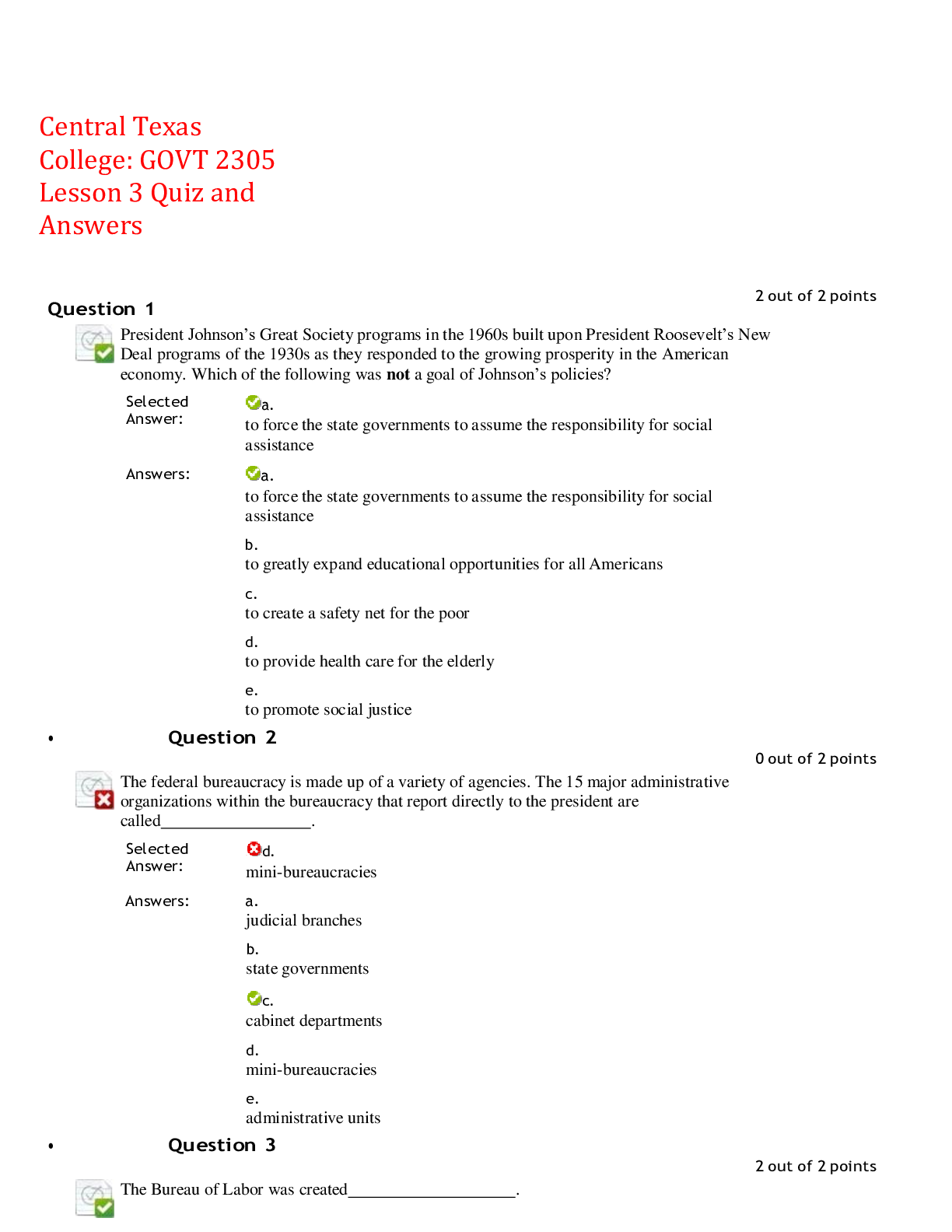
Reviews( 0 )
Document information
Connected school, study & course
About the document
Uploaded On
Aug 12, 2022
Number of pages
12
Written in
Additional information
This document has been written for:
Uploaded
Aug 12, 2022
Downloads
0
Views
62
